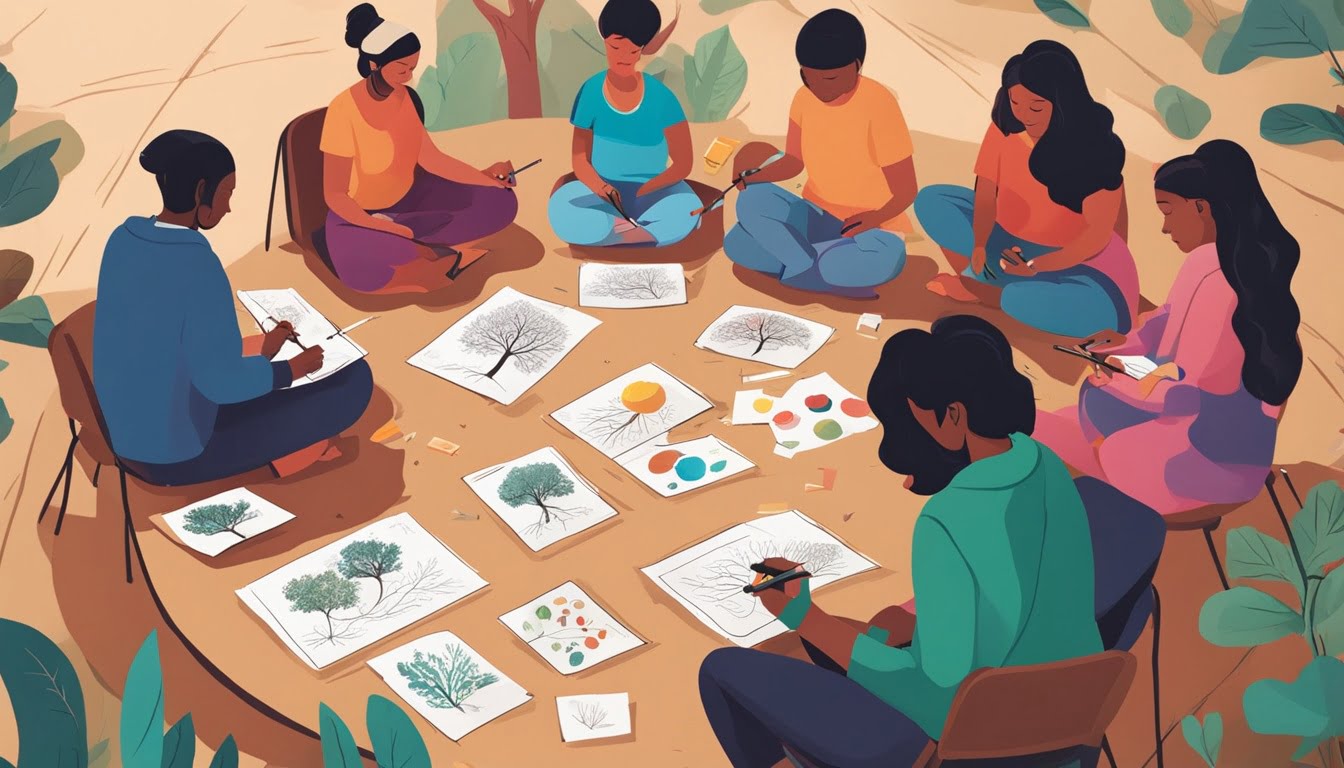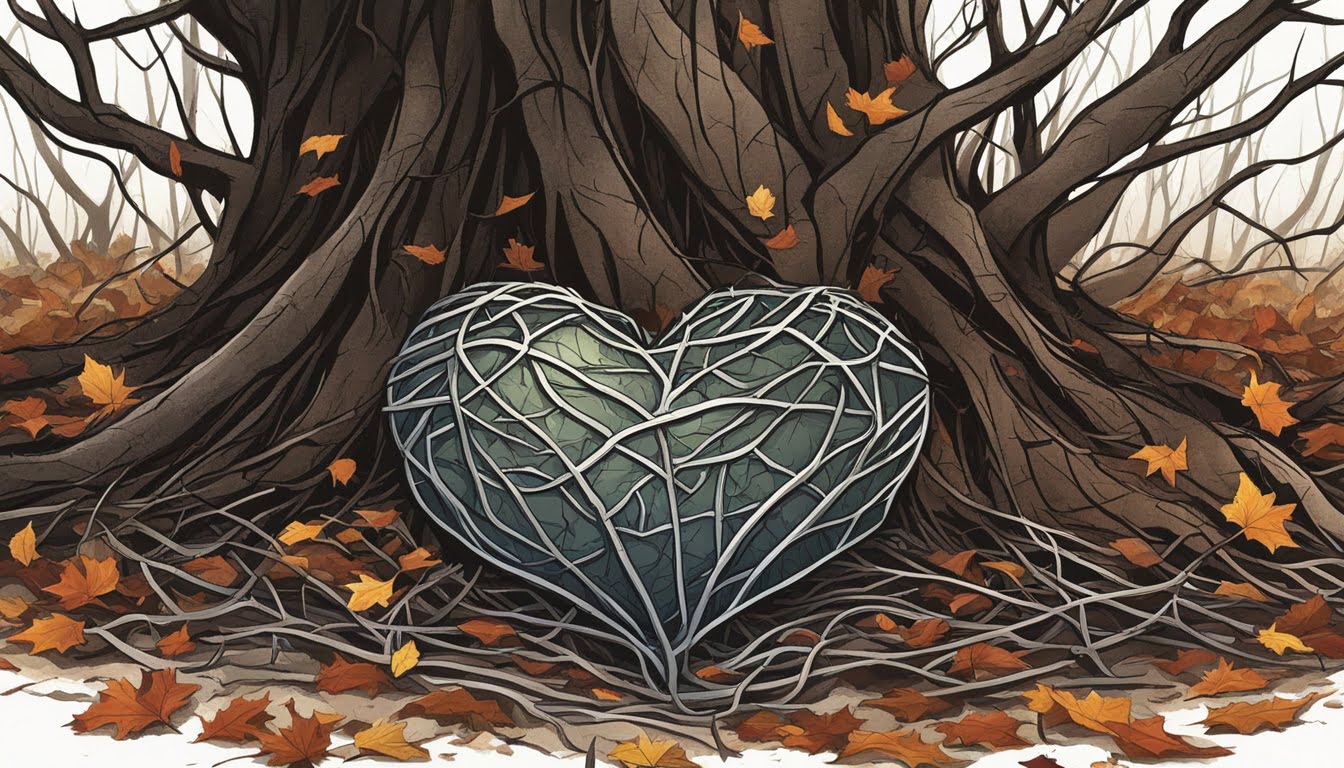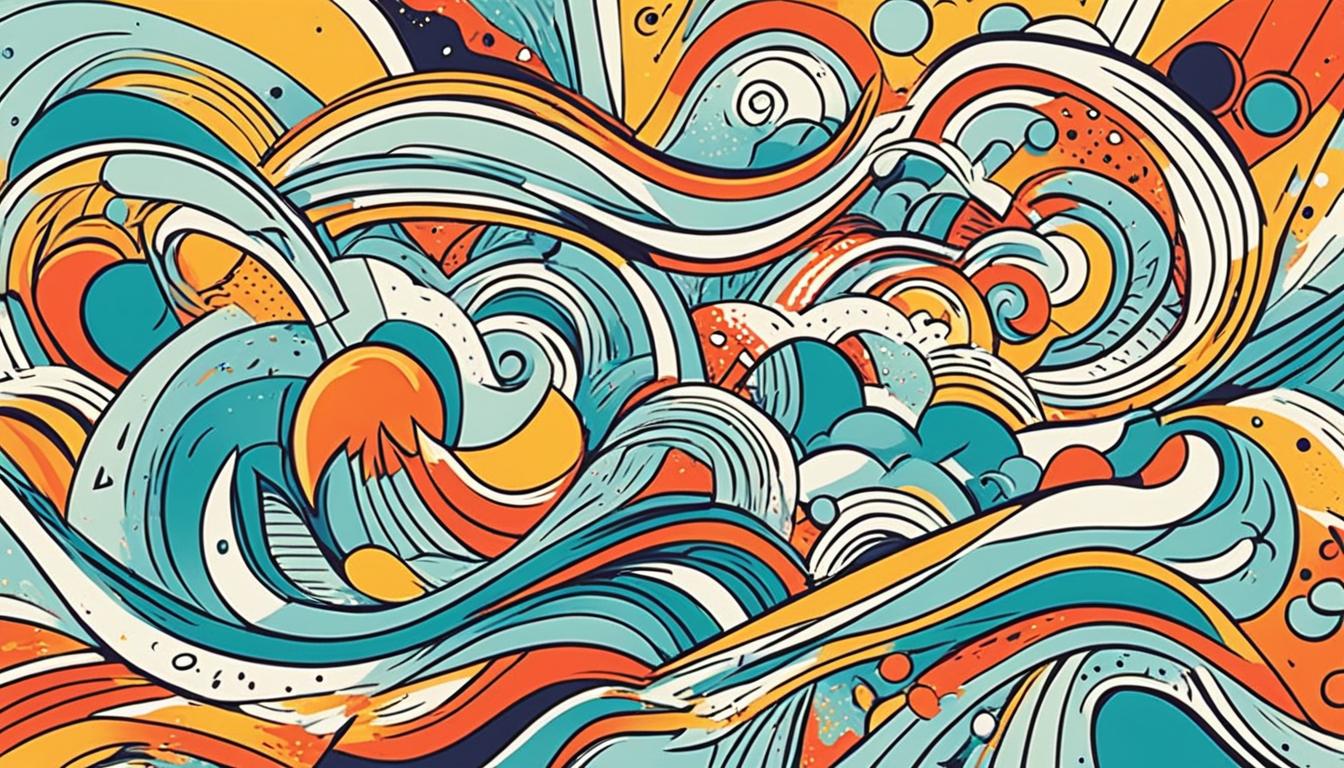Do I Have Childhood Trauma? Take the Quiz to Find Out
Childhood experiences shape our health and happiness as adults. ACEs, like abuse or neglect, can lead to serious health issues. If you're unsure about your past, our quiz can help. It's a step towards better health and happiness.
Studies prove ACEs increase the risk of many health problems. Our quiz helps you see how your past might affect you now. It's a key step in understanding and healing from past traumas.
Understanding Adverse Childhood Experiences (ACEs)
Adverse childhood experiences, or ACEs, are traumatic events that happen before a child turns 18. These can be abuse, neglect, or living in a dysfunctional home. Events like domestic violence, substance abuse, or having a family member in jail are examples. These events can deeply affect a child's growth and health later on.
Research Links ACEs to Negative Health Outcomes
Studies show a strong link between ACEs and mental and physical health problems later. This includes issues like depression, anxiety, heart disease, and cancer. The impact of these childhood traumas can be huge.
Toxic Stress and Its Impact on Development
Toxic stress in childhood can harm health by always turning on the stress response system. This is different from other stress types. It harms the heart, immune system, metabolic system, and the brain as it grows.
Learning about ACEs and their effects on health helps us help those who faced these issues as kids.
The Origins of the ACE Test
In 1995, a groundbreaking study by the Centers for Disease Control (CDC) and Kaiser Permanente started it all. This study found a strong link between bad childhood experiences and health problems in adulthood. It was a major discovery.
This study led to the creation of the ACE test. It aimed to understand how childhood trauma affects people later in life. Over 17,000 people were asked about their childhood and the challenges they faced.
The study's findings were shocking. It showed that many people had faced abuse, neglect, or a dysfunctional home. These experiences were much more common than people thought. The study also found a link between these experiences and health issues like heart disease and mental health problems.
After these findings, the ACE test was created. It's a tool to measure the risk of health problems due to childhood trauma. By counting the number of adverse experiences, the test helps understand the lasting effects of trauma.
The ACE questionnaire's history is tied to a groundbreaking study. This study changed how we see the link between childhood and adult health. It has led to better support for those who faced tough times as kids.
What Does the ACE Test Measure?
The ACE test is a key tool that shows how childhood trauma affects us later. It looks at 10 types of tough experiences that can change our health and happiness for life.
The List of ACEs
The ACE test looks at many hard times, including:
- Physical abuse
- Sexual abuse
- Emotional abuse
- Physical neglect
- Emotional neglect
- Mental illness in the household
- Substance abuse in the household
- Domestic violence towards a primary caregiver
- Parental separation or divorce
- Incarceration of a household member
Limitations of the ACE Test
The ACE test gives us important info, but it has its limits. It doesn't measure the good things in a child's life that can protect them, like supportive people, resources, and being part of a community. It also doesn't look at things like racism, violence in the community, and money issues that can really affect someone's life.
Knowing what the ACE test can and can't do helps us use it better. We can then work on fixing the lasting effects of childhood trauma in a full way.
Why Take the Childhood Trauma Quiz?
We all have unique life experiences that shape our health. One key factor is adverse childhood experiences, or ACEs. Taking a childhood trauma quiz helps us see how our past might affect our health.
Assessing Your Risk for Health Concerns
The quiz is a tool to check how our childhood affects our health now. It asks questions about our past to show possible ACEs like abuse or family issues. This helps us understand risks, such as:
- Mental health issues like depression, anxiety, and post-traumatic stress disorder
- Physical health problems such as chronic headaches, confusion, and memory loss
- Difficulties in maintaining a healthy nervous system, which is crucial for overall well-being
This quiz doesn't diagnose, but it's a first step. It helps us find support and work with experts to tackle our issues.
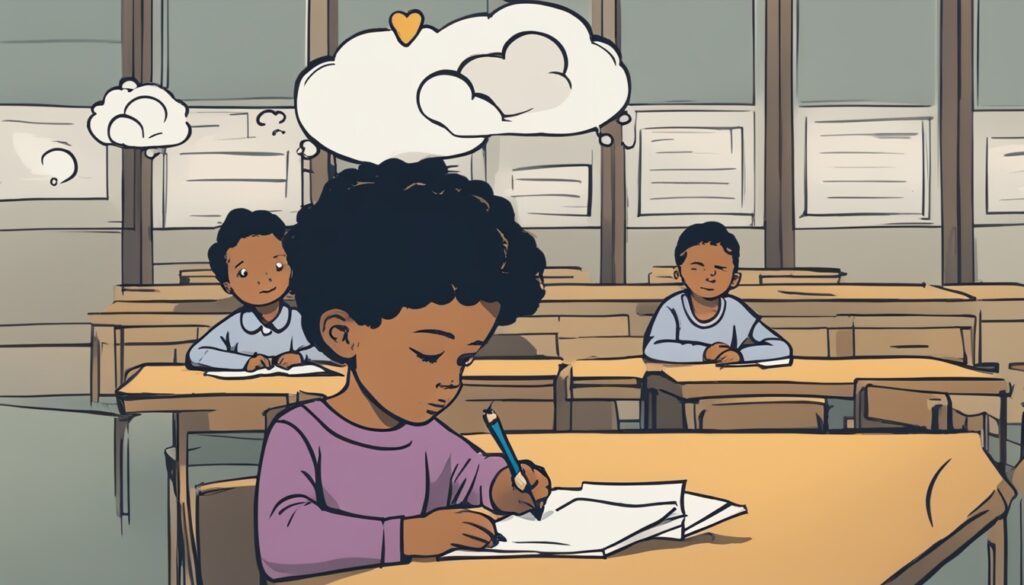
Understanding our experiences and health risks lets us take care of ourselves. We can find resources and support for a better life.
Interpreting Your ACE Score
Understanding your Adverse Childhood Experiences (ACE) score is key to seeing how your past affects your health now and in the future. ACE scores are not just numbers. They show the risk level of health problems linked to childhood trauma.
What is a "Normal" ACE Score?
An ACE score of 0-3 means you likely faced fewer tough times as a child. This doesn't mean you had an easy life, but it lowers the chance of health issues later on.
Understanding High ACE Scores
An ACE score of 6 or more means you're at higher risk for health problems like mental health issues, chronic diseases, and substance abuse. But, it's crucial to know that even with high scores, people can still live healthy, happy lives. The ACE test is just a starting point, not a final prediction of your health.
Your ACE score is a way to understand your past and find support if you need it. With the right help and strategies, people with high ACE scores can move past their challenges and do well.
Do I Have Childhood Trauma Quiz
Figuring out if we've faced tough times as kids is key to understanding our health and happiness. That's why we made a free quiz on our site. It's for people like you to check if you might have experienced childhood trauma.
The quiz has 22 questions. They come from the Adverse Childhood Experiences Questionnaire for Adults, the Trauma History Questionnaire, and the Childhood Trauma Questionnaire. By answering, you can get an ACE score. This score shows your risk of health problems linked to childhood trauma.
If you're wondering about your past or want to learn how ACEs affect you, this do i have childhood trauma quiz is a good start. The free ace test is quick, private, and simple. It helps you begin your journey to healing and growing.
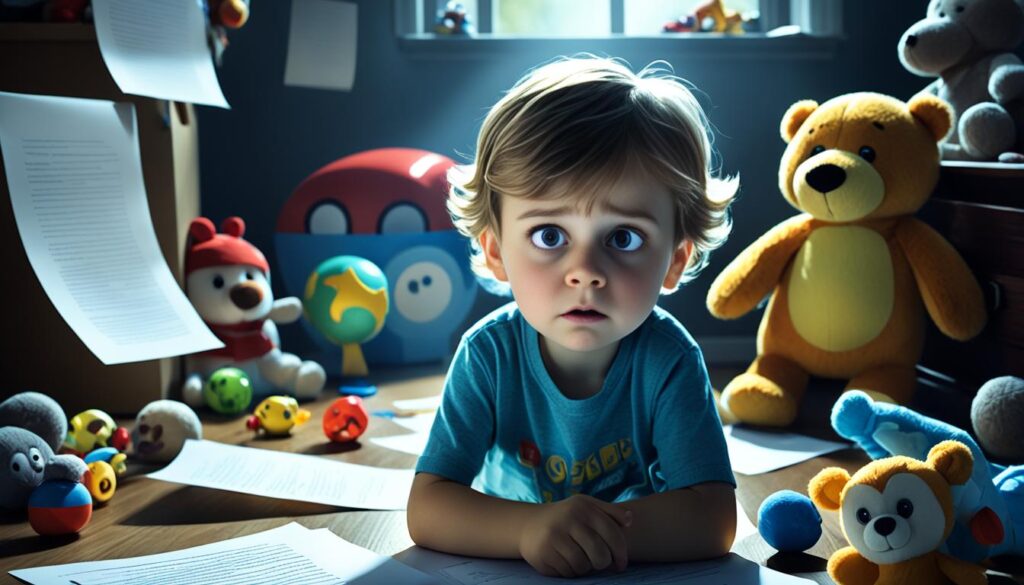
By looking into your childhood through this quiz, you'll know better what affects your health now. With this info, you can work with doctors to make a plan. This plan will help you deal with childhood trauma and build strength.
The Importance of Preventing ACEs
Preventing adverse childhood experiences (ACEs) is key to reducing health risks. Studies show that tackling childhood trauma early can bring big benefits over a person's life.
Potential Benefits of Preventing Childhood Trauma
Stopping ACEs can lower the risk of many health problems. These include depression, kidney disease, stroke, heart disease, cancer, and diabetes. It also means less chance of smoking, drinking, or losing a job later on.
Preventing childhood trauma does more than just help with health. It can make life better overall. People can enjoy better relationships and do well in life.
- Reduced risk of physical and mental health issues
- Lower chances of engaging in unhealthy behaviors
- Improved overall well-being and quality of life
By focusing on preventing ACEs, we help people and communities overcome trauma. This leads to a healthier, stronger society. The long-term benefits of stopping childhood trauma make it a key focus for health and social welfare.
Seeking Support for Childhood Trauma
Dealing with the effects of childhood trauma can feel tough and scary. But, you're not alone. Getting help from experts who understand trauma can be a big step towards healing.
Working with Trauma-Informed Professionals
Therapists or counselors who focus on childhood trauma have the skills to help you. They know how trauma can affect you deeply and can guide you in healing. They offer treatments that are based on solid research and fit your needs.
With these professionals, you'll find a safe space to talk about your past and learn new ways to cope. They'll help you figure out what's causing your struggles and make a plan to overcome them.
- They use therapies like cognitive-behavioral therapy (CBT) and EMDR to help you deal with your past.
- They give you tools and methods to handle stress, control your feelings, and grow stronger.
- They always put your safety and comfort first, making sure you feel supported and in charge of your healing.
Remember, asking for help with childhood trauma shows strength, not weakness. By reaching out to a trauma-informed professional, you're taking a big step towards taking care of yourself. This opens the door to a happier, more meaningful life ahead.

The Role of Positive Experiences
The ACE test looks at tough times in childhood, but it's key to see how good times can help. Having a trusted adult, like a grandparent or teacher, can make a big difference. They offer a safe space that lessens the stress of hard times. These good experiences help build strength and can lead to better lives, even for those who faced a lot of challenges as kids.
Studies show that good experiences, or "positive childhood experiences" (PCEs), can lessen the bad effects of tough times. PCEs include:
- Feeling loved and supported by family members
- Joining in on activities outside of school
- Having a caring adult outside of family, like a teacher or mentor
- Feeling like you belong in your community
- Learning how to cope and solve problems
These good times can make you stronger, improve your social skills, and boost your overall health. Even with a tough childhood, focusing on these positive moments can help you move forward and do well today.
Seeing how good times can help is key to understanding how childhood trauma affects us later. By making sure people have supportive relationships and fun experiences, we can help those who had a hard time as kids to look forward to a better future.
Conclusion
Taking the childhood trauma quiz is a key step in understanding your past and its impact on you now and in the future. It's not a definitive diagnosis, but it opens doors to talk with healthcare experts. They can help you make a plan to deal with the effects of childhood trauma.
You're not alone in this journey. There are many resources and support systems ready to help you heal and grow stronger. By thinking deeply about your past and getting advice from experts, you're taking steps towards a better future.
The end of the childhood trauma quiz marks the start of a new chapter. With an open mind, kindness towards yourself, and a commitment to the healing process, you can find new ways to improve your health and personal growth.
FAQ
What are Adverse Childhood Experiences (ACEs)?
ACEs are bad events that happen before a child turns 18. These include abuse, neglect, or problems at home. They can cause stress that harms the body and brain as it grows.
How are ACEs linked to negative health outcomes?
Studies show ACEs lead to bad health effects. They hurt both the mind and body. This includes higher risks of depression, kidney disease, stroke, heart disease, cancer, and diabetes.
What is the origin of the ACE test?
The ACE test started in 1995 by the CDC and Kaiser Permanente. They found ACEs link to health and social problems in adulthood.
What does the ACE test measure?
The ACE test looks at 10 types of bad childhood events. These include abuse, neglect, and family problems. It also looks at mental illness, violence, substance use, and more.
What are the limitations of the ACE test?
The ACE test doesn't measure good childhood experiences. It also ignores things like racism, violence, and lack of resources.
Why should I take the childhood trauma quiz?
The quiz helps you understand your past and its effect on your health. It's a tool to check your risk for health issues linked to childhood trauma.
How do I interpret my ACE score?
Think of ACE scores as a risk level, not good or bad. A score of 0-3 means low risk. A score of 6 or higher means higher risk of health problems.
What is the purpose of the free childhood trauma quiz on your website?
Our quiz helps you see if you've had ACEs and how much. It uses 22 questions based on proven methods.
How can preventing ACEs improve well-being?
Stopping ACEs reduces health risks like depression and diabetes. It also lowers the chance of smoking, drinking, and losing a job.
How can I seek support for the impact of childhood trauma?
If childhood trauma affects you, know you're not alone. Seek help from therapists or counselors who understand trauma.
How can positive experiences in childhood help mitigate the effects of trauma?
Positive experiences can lessen trauma's harm. Having a caring adult can make a big difference in a child's life.
Source Links
- https://www.charliehealth.com/activities/childhood-trauma-quiz - Childhood Trauma Quiz
- https://breeze-wellbeing.com/childhood/start/ - Breeze - Childhood Trauma Test
- https://psychcentral.com/quizzes/ace-test - ACE Test: Do You Have Childhood Trauma?
An Introduction to Child Psychology: Understanding the Basics
Child psychology is at the core of human growth and development. It's about how children think, feel, and act as they grow. This field studies their cognitive, emotional, and social growth. It shows how nature and nurture work together.
We'll explore the main stages of childhood, from infancy to adolescence. Knowing these stages helps us support children's healthy growth. This way, they can reach their full potential.
If you're a parent, teacher, or just interested in human behavior, this guide is for you. It gives you the basics of child psychology. Let's start this journey together, unlocking the secrets of our children's lives.
The Magic of Childhood: What is Child Psychology?
Child psychology is a field that looks into the complex world of young minds. It studies how kids change as they grow, in their thinking, feelings, and social skills. This field is key to understanding how children think, feel, and act.
Child psychology focuses on child development. It looks at child psychology, child development, cognitive development, emotional development, social development. From birth, a child's brain is busy making new connections and processing information. As they grow, they learn to understand the world better.
Child psychology also looks at a child's feelings and social life. Kids learn to handle their emotions and interact with others. They develop important skills like empathy, communication, and solving conflicts.
Unlocking the Mysteries of Child Development
Child psychologists study how different parts of child development connect. They look at nature vs. nurture, the role of relationships, and social skills. Their goal is to understand what makes children grow and succeed.
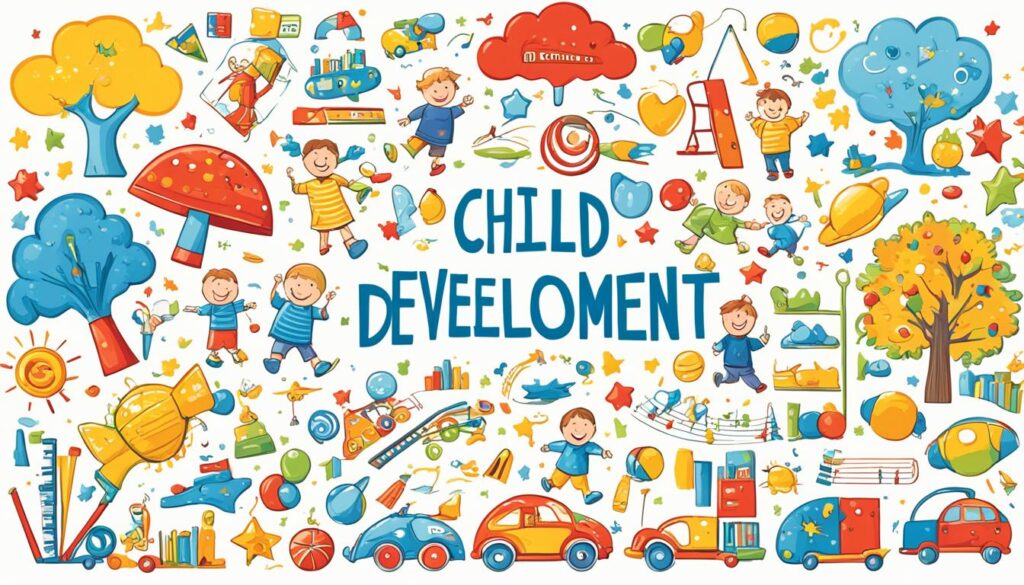
Exploring child psychology reveals the amazing story of childhood. It's about change, discovery, and the huge potential of the human mind. Let's join this journey and discover the magic of childhood together.
The Building Blocks of Development: Stages of Childhood
Children grow through different stages, each with its own traits and milestones. Knowing about child development stages helps parents, teachers, and those working with kids. Let's look at the main stages of childhood and how they influence growth.
Infancy and Toddlerhood: This early stage sees fast physical growth, the start of motor skills, and early communication skills. Babies and toddlers start to interact with their world, making important connections. These early steps set the stage for growth later on.
Early Childhood: In the early childhood years, kids start to talk, play imaginatively, and find their own identity. They grow their social skills and learn more about the world around them.
- Middle Childhood: Kids' cognitive abilities keep getting better, they make more friends, and self-esteem grows.
- Adolescence: Teens go through a time of identity exploration, wanting more independence, and big emotional changes.
Knowing about child development stages is key to helping kids grow and be happy. By understanding each stage's unique needs, we can support them through childhood and adolescence better.
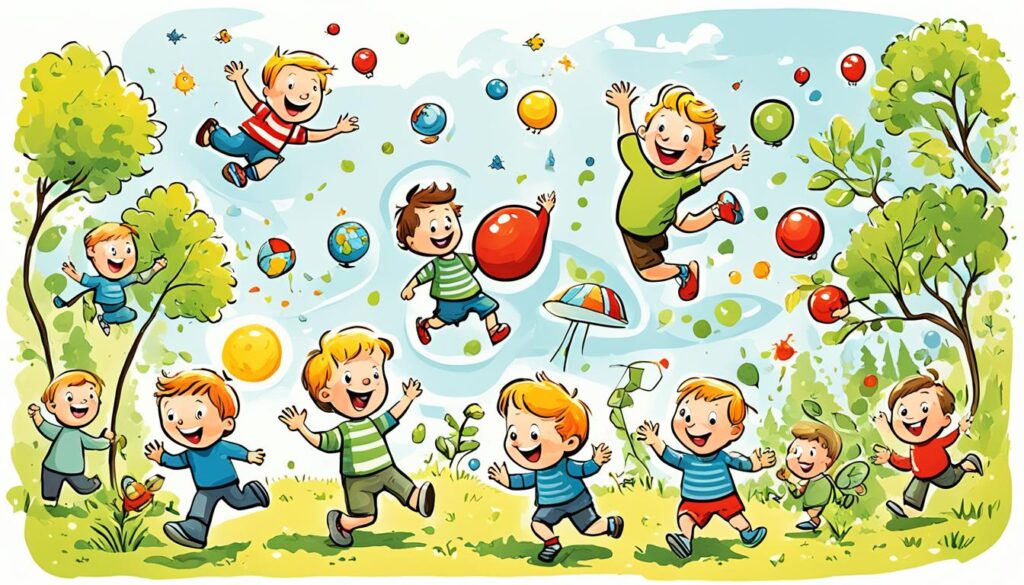
Unlocking the Child's Mind: Key Concepts in Child Psychology
To really get what a child thinks and feels, we need to know some key ideas in child psychology. These ideas help us see how kids think, feel, and connect with their world.
Nature vs. Nurture
The debate about nature vs. nurture looks at how genes and the environment shape a child. It shows us how kids grow and become who they are. This balance helps us understand kids in many ways.
Attachment Theory
Attachment theory talks about the early emotional ties between kids and their caregivers. These early bonds are key to a child's emotional health, social skills, and growth. They affect a child's life a lot.
Cognitive Development
Jean Piaget's work has shown us how kids build their understanding of the world. Knowing these stages helps us support their learning and thinking.
Socialization
Socialization is key to a child's growth. It's how they learn about the world from family, friends, and society. This shows us how important it is to have a good social environment for kids.
Exploring nature vs. nurture, attachment theory, cognitive development, and socialization helps us understand child psychology better. This knowledge lets us support kids' healthy growth and well-being.
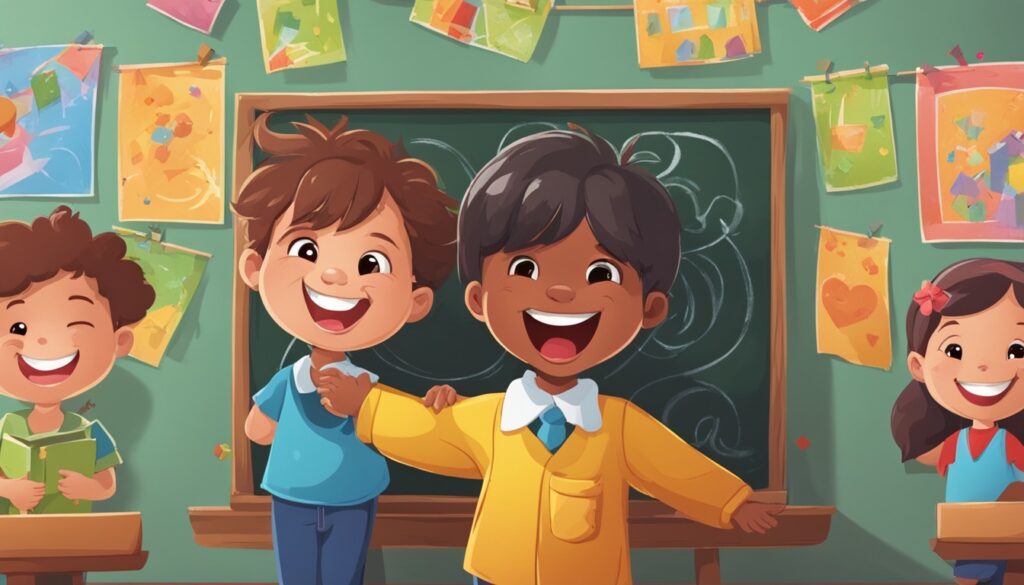
- Explore advanced child psychology theories and concepts
- Gain practical insights to promote healthy child development
- Enhance your professional skills and credentials in the field
- Make a positive impact on the lives of children and their families
Don't miss this chance to deepen your understanding of child psychology. Enroll in our "Certification in Child Psychology" course today. Start a journey of ongoing learning and growth.
Child psychology
Child psychology is a fascinating field that looks into how kids grow mentally, socially, and emotionally from birth to being teenagers. It's all about figuring out what makes each child act and develop in their own way. This branch of psychology helps us see the complex things that shape their lives.
At its core, child psychology aims to understand how kids think, feel, and connect with others as they grow. Experts in this area share important findings with parents, teachers, and those who care for kids. This helps them support a child's healthy growth and happiness.
Unlocking the Mysteries of Child Behavior
Child psychology covers many topics like learning, genes, thinking skills, and emotional health. Experts in this field work hard to spot and solve problems kids might face as they grow. They help kids deal with the challenges of growing up.
Child psychologists are key in helping kids develop fully. They make sure kids have the skills and support they need to do well in school, with friends, and on their own.
Learning about child psychology helps us value the incredible journey of childhood. It shows us how childhood sets the stage for a child's future success and happiness.
Understanding Child Development: An Overview
As parents, we are key to our children's growth and development. Child development covers physical, cognitive, and psychosocial changes from infancy to adolescence. Developmental psychologists study these changes to understand how children grow over time.
Child development mixes nature and nurture. Nature includes a child's genetic makeup, affecting their abilities and traits. Nurture is about the environment, like family and school, that shapes a child's growth and happiness. Knowing these factors helps us support our children's physical, cognitive, and psychosocial development.
The Pillars of Child Development
Child development includes several key areas:
- Physical Development: This covers growth in height, weight, and motor skills, along with the development of senses and the nervous system.
- Cognitive Development: This is about the child's thinking skills, like solving problems, remembering things, paying attention, and learning new languages.
- Psychosocial Development: This looks at the child's emotional, social, and behavioral growth. It includes forming relationships, managing feelings, and getting along with others.
Knowing about these areas helps us support our children's overall well-being and help them reach their potential.
Parenting is a journey of supporting our children's growth. Each child grows at their own pace and has unique milestones. By paying attention to their needs and creating a caring environment, we can help them develop well.
The Role of Parents in Supporting Children's Development
As parents, we are key to our children's growth. We shape the world they see and learn from. Good parenting means understanding our child, helping them feel emotionally secure, and teaching them to get along with others.
Child psychologists stress the need for a safe and caring home. They help us be better parents and boost our kids' mental health.
Fostering Emotional Resilience
Helping our kids be emotionally strong is vital. We can do this by:
- Accepting their feelings and emotions
- Teaching them ways to cope
- Showing how to manage our own feelings
Encouraging Social Skill Development
Helping our kids with social skills is important too. We can do this by:
- Offering chances for them to meet others
- Teaching them how to solve problems
- Encouraging good social actions
By knowing our role and using good parenting tips, we make a place where our kids can grow and succeed.
Conclusion
Child psychology helps us understand and support kids as they grow. It shows us how to help children's mental health. From babies to teens, each stage has its own challenges and chances for growth.
Knowing about child psychology is key to helping kids grow well. By learning about child development, we see how kids think, feel, and behave. This knowledge lets us make places where kids can be happy and reach their goals.
As we finish our look at child psychology, we see it's a team effort. Parents, teachers, and experts can work together. Together, we can make a world where every child is valued, strong, and ready to succeed.
FAQ
What is child psychology?
Child psychology studies how kids think, feel, and act as they grow. It looks at their thinking, feelings, and social skills. It shows how these things work together to shape their view of the world.
What are the key stages of childhood development?
Childhood has different stages, each with its own milestones. These include Infancy and Toddlerhood, Early Childhood, Middle Childhood, and Adolescence.
What are some key concepts in child psychology?
Understanding child behavior and growth means knowing a few key ideas. These include Nature vs. Nurture, Attachment Theory, Cognitive Development, and Socialization.
How can the "Certification in Child Psychology" course help me?
If you want to understand and help young minds, our "Certification in Child Psychology" course is great. It goes deep into child psychology, covers advanced theories, and gives practical tips for healthy child development.
What is the role of parents in supporting children's development?
Parents are crucial in a child's growth. They create the space where kids learn about people and the world. Good parenting means understanding the child's actions, supporting their feelings, and helping them with social skills.
How does child psychology provide a framework for understanding and supporting children?
Child psychology offers a strong way to understand and help children grow. It teaches parents and professionals how to support kids' mental health. Each stage of childhood, from infancy to adolescence, has its own challenges and chances for growth.
Source Links
- https://www.open.edu/openlearn/education-development/childhood-youth/introduction-child-psychology/content-section-0 - Introduction to child psychology
- https://kaleidoscope.com.sg/introduction-to-child-psychology/ - Introduction to Child Psychology: Understanding the Development and Well-being of Children
Top Mental Health Group Activities for Adults
Good mental health is key for adults, and group activities help a lot. Group therapy is a place where you can meet others, share stories, and learn new ways to cope. By doing different group activities, you can get better emotionally, make friends, and grow personally. We'll look at some top group activities that help adults improve their mental health and life quality.
Group therapy is great for adults facing issues like anxiety, depression, and feeling lonely. You get to talk, do activities together, and support each other. This way, you learn from others, see things from new angles, and feel part of a community. These activities boost skills like talking, solving problems, and handling emotions, which are good for your mental health.
What is Group Therapy?
Group therapy is a way for people to work on their mental health together. It started in the early 1900s with Dr. Joseph Pratt. He used group sessions to help patients with tuberculosis. He found that these groups made patients more hopeful, brave, and helped them get better faster.
Historical Background
After that, more mental health experts saw the good in group therapy. They noticed it helped with emotional support, learning, and guidance. Now, it's a key part of treating many mental health issues like depression, anxiety, trauma, and addiction.
Benefits of Group Therapy
Being in a group therapy can really help you feel better. Here are some main benefits:
- Reduced feelings of isolation and loneliness
- Improved communication and interpersonal skills
- Gaining new perspectives and insights from peers
- Learning effective coping strategies from group members
- Cost-effective access to mental health services
Group therapy creates a supportive space. It helps people work on their mental health and grow personally.
Warm-Up Activities for Group Sessions
Starting group therapy with fun activities helps everyone connect, feel less anxious, and get ready for deep talks. These icebreakers and bonding exercises work well for all ages and goals. Here are some great ideas to make your next group session lively.
"Two Truths and a Lie" is a top choice for getting to know each other. Everyone shares two true facts and one false statement about themselves. The group then tries to spot the lie. This game builds trust and understanding.
"Give Me a Minute" is another great pick. Each person talks about a random topic for one minute. It boosts spontaneity, listening skills, and quick thinking. These are key for group therapy.
- Desert Island: What items would you take to a desert island? It shows what matters most to you and your personality.
- Scavenger Hunt: Teams compete to find or make items on a list. It's all about teamwork and solving problems together.
- Collaborative Drawing: Everyone adds to a drawing, making it a creative and bonding experience.
Using these fun activities makes clients feel at ease, connected, and ready for the session's deeper topics. Starting with something positive and interactive prepares everyone for a productive and meaningful group therapy session.
Narrative Therapy Group Activities
Narrative group therapy helps clients own their life story. Through fun activities, they can look at their stories, change their past, and dream of a better future. Let's explore three key exercises that boost self-expression, understanding, and growth in your group.
My Life Story
In "My Life Story," clients pick five to 10 chapter titles that sum up their life's big moments. They share each chapter, showing that the past is gone and the future is full of new chances. This activity makes personal stories in group therapy and storytelling important. It lets clients shape their life stories.
Statement of Position Map
The "Statement of Position Map" lets clients see how a problem affects their life in every area. They map the problem's effects and see how it deeply touches them. Sharing these maps in the group gives support, validation, and a way to map problems in therapy.
Expressive Art Storytelling
"Expressive Art Storytelling" has group members create art like drawing or painting to music. Then, they share what their art means to them. This helps everyone understand each other better and uses art therapy in group settings. It makes creative storytelling in groups possible and lets people tell their stories in a new way.
These activities in narrative therapy let clients shape their life stories. They build understanding and support among group members. By adding these to your therapy, you help your clients take back their stories and look forward to a better future.
Activities for Anxiety and Depression
Group therapy for anxiety and depression can really help. Activities like group affirmations and cognitive-behavioral therapy (CBT) exercises are key. They help people manage their mental health better.
Affirmations
A great activity is having each group member write a positive affirmation for another. It's super uplifting for those with depression. It also helps lower anxiety as the group grows closer.
Healthy Brainstorming
"Healthy Brainstorming" is another powerful tool. Members write down mental health goals, like better eating, more exercise, or improving sleep. Then, the group works together to find ways to make these changes happen.
Thought Replacement
"Thought Replacement" is based on CBT. Members pick a negative thought and a partner suggests a positive one. This helps them practice cognitive restructuring. It's key for fighting anxiety and depression.
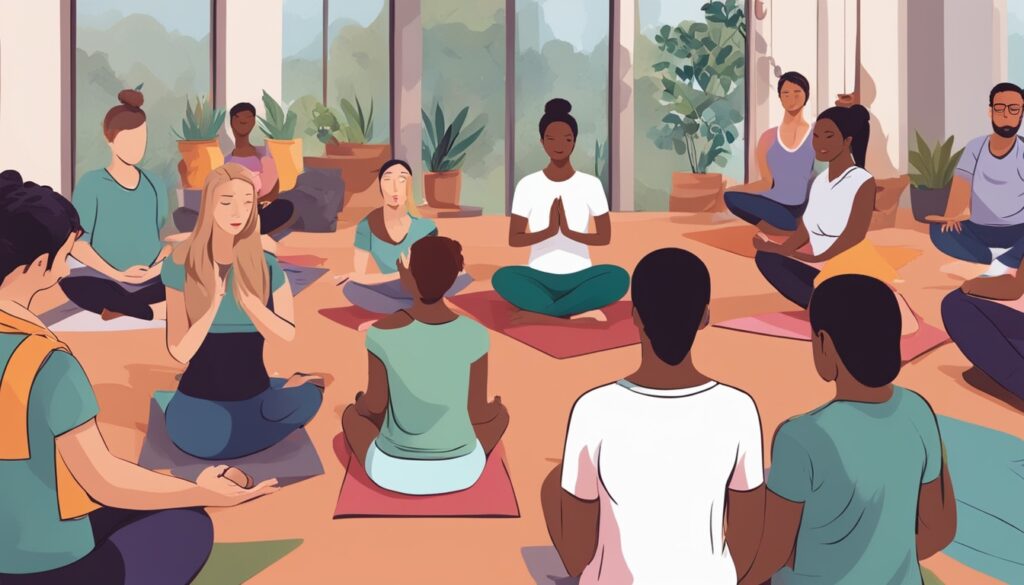
Activities for Coping with Loneliness
Group therapy is a great way to deal with loneliness. It helps you feel connected and understood with others who are going through the same thing. Here are some fun group activities that can make you feel less alone:
Person to Person
This activity makes you talk and connect with others in the group. You'll be paired up and ask each other questions like "What's your favorite hobby?" or "What are you proud of?" It's a way to find out what you have in common with others, making you feel less isolated.
Interview Activity
In this activity, you get to interview another group member. You'll learn about their life, interests, and views. By really listening and connecting with someone, you feel understood and part of the group. This can be a big help in fighting loneliness.
These activities help you feel more connected and give you a safe place to talk about your feelings. You can share your story and learn from others. Doing these things in a group can help you break free from feeling alone and build strong bonds with others.
Activities for Grief and Loss
Dealing with grief and loss is tough. But, group therapy and activities can really help. They offer a safe place for people to share feelings, understand grief better, and find ways to cope.
Expressive arts are a great way to tackle grief. Activities like guided imagery let people dive into their feelings. Sharing stories in the group helps everyone support and heal together.
- Activities like painting or writing can express feelings deeply.
- Guided imagery helps people connect with their inner selves and find peace.
- Sharing stories in the group brings empathy and support, and everyone learns from each other.
These activities make people feel not so alone in their grief. They also give them tools to handle tough times. Being in a caring group helps people find strength, hope, and support.
Mental Health Group Activities for Adults
Group therapy activities are key for adults looking to boost their mental health. They help with self-discovery, improve communication, and support personal growth. In a safe space, adults can learn to overcome challenges together.
Therapists offer many activities like icebreakers, problem-solving, and art therapy. Each activity is chosen to meet the group's specific needs and goals.
A favorite activity is using affirmations. Adults create positive statements to fight negative thoughts and boost confidence. "Healthy brainstorming" is another great exercise. The group works together to find solutions for mental health issues like anxiety or loneliness.
- Expressive art storytelling: Participants use art to tell their stories, promoting self-expression and emotional growth.
- Thought replacement: The group helps replace negative thoughts with positive ones.
- Guided imagery: This involves relaxation and visualization to help with stress and anxiety.
By offering a variety of activities, mental health experts can meet the unique needs of their clients. These activities create a supportive space. They also help adults take charge of their mental health.
Art Therapy Group Activities
Art therapy group activities help people express themselves and grow. They include "Collaborative Drawing" and "Mask-Making." These activities help with art therapy group activities, working together in art, and understanding one's identity.
Collaborative Drawing
In "Collaborative Drawing," everyone adds to a single drawing. This builds teamwork and understanding. It lets people show who they are through art and helps them feel part of a group.
Mask-Making
"Mask-Making" is another activity where people make masks of their true and hidden selves. It makes them think deeply about who they are and what they feel. Making masks is a way to express oneself creatively in group therapy.
These activities let people explore themselves, connect with others, and improve their well-being. They are great for group art projects.
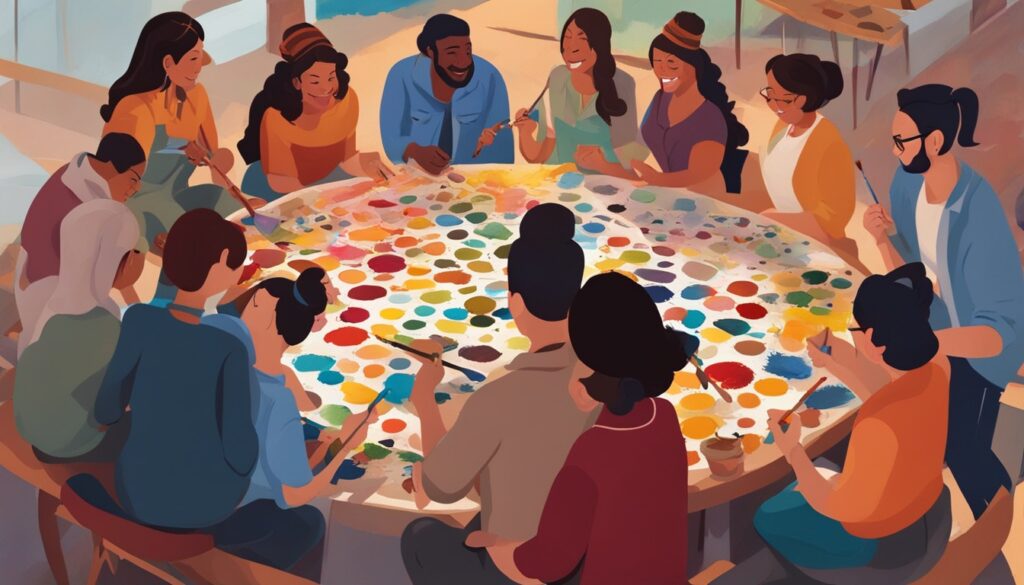
Music Therapy Group Activities
Music therapy is a powerful way to build connections and express oneself in a group. By taking part in music therapy group activities, people find common ground and a sense of belonging. A fun activity is making a group playlist. Everyone adds songs that mean something to them or match their mood.
Group songwriting is another key part of music therapy. Here, the group works together to write a new song. This lets them share their feelings and thoughts through music. It helps strengthen the group's bond and creates a sense of togetherness.
Groups might also try guided improvisation, making up songs on the spot together. These moments of shared music help people manage their emotions better, talk more openly, and feel more connected to the group.
Music therapy groups offer a special chance for people to connect, express themselves, and grow in a caring, team setting.
Mindfulness and Relaxation Activities
Adding mindfulness and relaxation to group therapy helps a lot. It cuts down stress and anxiety. It also boosts well-being and self-awareness. Guided imagery and progressive muscle relaxation are great for groups.
Guided Imagery
Guided imagery is a way to calm the mind. It involves imagining a peaceful place. This helps people feel calm and mindful.
It's great for groups dealing with stress or wanting to improve body awareness in therapy.
Progressive Muscle Relaxation
Progressive muscle relaxation is another good activity. It makes you tense and then relax each muscle group. This helps with both physical and mental relaxation.
It's especially good for groups working on anxiety and relaxation in therapy.
Using these activities in group therapy makes the setting calmer and more focused. It helps people work on their mental health and feel better overall.
Personal Growth and Self-Esteem Activities
Group therapy is a great way to grow personally and boost self-esteem. It offers a supportive space for people to find their strengths, set goals, and see themselves in a better light. These activities help people discover themselves and reach their goals.
The self-reflection journal is a key tool for growth. Group members think about their values, past experiences, and what they want to improve. Sharing these thoughts with others brings new ideas and feedback that helps them grow.
Goal-setting with accountability partners is another powerful activity. It lets group members set and support each other's goals. They pick a partner to keep track of each other's progress, celebrating wins and offering support.
For building self-esteem, groups focus on personal strengths exploration. Exercises help people find their talents, skills, and good qualities. Sharing these with the group boosts self-awareness and builds a supportive community.
Adding these activities to group therapy helps people start a journey of self-discovery and empowerment. The group setting is a safe place for people to grow and celebrate their achievements.
Conclusion
Group therapy is a powerful way for adults to get better mentally and emotionally. It offers a chance to connect with others, learn new ways to cope, and grow personally. Through various activities, you can tackle issues like anxiety, depression, loneliness, and grief.
These activities make group therapy a supportive and empowering place. It helps you boost your self-esteem, manage stress, and face life's challenges. You'll find a safe space to share experiences and grow with others.
Being part of mental health group therapy helps you and others get better. It's a collective effort that can lead to positive change and a stronger community. Join group therapy to start a journey of self-discovery, resilience, and personal growth.
FAQ
What is group therapy?
Group therapy is a type of therapy where a group of people meet with a therapist. They work together to deal with mental health issues, improve their well-being, and find ways to cope.
What are the benefits of group therapy?
Group therapy offers many benefits. It helps people feel less alone, learn from others, and grow emotionally. It also improves mental and physical health by providing support and new skills.
What are some warm-up activities for group therapy sessions?
Warm-up activities include "Two Truths and a Lie," "Give Me a Minute," and "Desert Island." These games help clients connect, feel less anxious, and focus on the session's topics.
What are some narrative therapy group activities?
Narrative therapy activities are "My Life Story," "Statement of Position Map," and "Expressive Art Storytelling." They help clients tell their stories, understand problems, and use art to express their experiences.
What are some activities for addressing anxiety and depression in group therapy?
For anxiety and depression, try "Affirmations," "Healthy Brainstorming," and "Thought Replacement." These activities help clients write positive messages, brainstorm solutions, and change negative thoughts.
How can group therapy help with loneliness?
Group therapy fights loneliness with "Person to Person" and "Interview Activity." These activities make members interact and find common ground, reducing isolation.
What are some group therapy activities for grief and loss?
For grief, use expressive arts, guided imagery, and discussions. These help members share their feelings and support each other through tough times.
What are some art therapy group activities?
Art therapy includes "Collaborative Drawing" and "Mask-Making." In these, members work together on drawings or create masks that show their true and perceived selves.
What are some music therapy group activities?
Music therapy can be making playlists or writing songs together. These activities let people express feelings and thoughts through music.
What are some mindfulness and relaxation activities for group therapy?
Activities like "Guided Imagery" and "Progressive Muscle Relaxation" are used. They help participants relax by visualizing or tensing and relaxing muscles.
What are some activities that foster personal growth and self-esteem in group therapy?
To grow personally and boost self-esteem, try self-reflection, setting goals, and exploring strengths. These activities help group members understand themselves better and feel more positive about themselves.
Source Links
- 29 Best Group Therapy Activities for Supporting Adults
- 33 Group Therapy Activities, Exercises & Questions | Free PDF Download
- Group Activities
Creative Group Ideas for Mental Health in Adults
Explore fun group activities for mental health that boost adult wellbeing. This article is for mental health experts and anyone wanting to improve their wellness. It offers creative ways to build connections, grow, and bounce back in a group. You'll find everything from icebreakers to arts that help adults feel part of a community, manage their feelings, and reach their goals.
Group therapy has a long history, starting with Joseph Pratt in 1905. He noticed that patients who talked and interacted in groups got better faster than those who didn't. Now, adult group therapy is still a key method. It offers emotional support, learning, and guidance that betters mental, emotional, and physical health.
The Importance of Group Therapy for Mental Health
Group therapy is a key tool for supporting adults' mental health. It brings people together who face similar issues. This creates a space for connection, understanding, and growth.
The benefits of group therapy are many and deep. It helps people feel less alone and more supported.
Group Therapy: A Brief History and Overview
Group therapy started in the early 1900s with psychiatrist Joseph Pratt. He saw how sharing experiences in groups helped patients recover faster and stay healthier.
Now, group therapy is crucial for treating many mental health issues like depression, anxiety, trauma, and addiction. It helps people learn from each other and find new ways to cope.
- Group therapy creates a sense of community and belonging, reducing isolation.
- Participants gain from the different views and stories shared in the group.
- The group setting boosts accountability and motivation as members support each other's progress.
- It's often more affordable than one-on-one therapy, making it accessible to more people.
Group therapy uses the strength of shared experiences and support. It's a valuable tool for those looking to improve their mental health and well-being.
Warm-Up Activities for Building Connections
Starting group therapy on the right foot is key to improving mental health. Group therapy warm-up activities help clients connect, feel less anxious, and focus on important topics. These exercises let everyone express themselves, bond as a group, and learn about each other.
Creative Ice-Breakers for Group Bonding
A fun ice-breaker is Two Truths and a Lie. Clients share two true and one false statement about themselves. It starts conversations and helps members get to know each other in a fun way. Another great icebreaker is Give Me a Minute, where everyone talks about a random topic for a minute. It boosts spontaneity, quick thinking, and public speaking, all while building group connections.
These activities are key for building connections in group therapy. Adding them to your sessions makes clients feel more at ease, engaged, and prepared for the therapy ahead.
Narrative Therapy Group Activities
Narrative therapy lets people own their life story and change it. It creates a space between the person and their experiences. This helps clients see problems without letting them define who they are. In group therapy, people can share and explore their stories together.
"My Life Story" is a fun group activity. Participants pick five to ten chapter titles that highlight key moments in their lives. It makes them think about their growth and strength.
Another great activity is the "Statement of Position Map." Clients map how a problem affects different parts of their life. It shows the deep impact of challenges on their stories.
Expressive art storytelling is also powerful. Group members make art that tells their stories. It helps them share their feelings and experiences in a new way. This boosts self-expression and helps the group understand each other better.
These activities help clients shape their life stories and connect with others. They lead to personal growth and healing. Through these exercises, adults in therapy can find their strength and see their lives in a new light.
Group Activities for Anxiety and Depression
Group therapy is a strong way to handle anxiety and depression. It offers support, new views, and strategies for better mental health. Here are some group activities that help with these issues.
Affirmations
"Affirmations" is a key activity where members write positive statements about each other. It boosts self-esteem and builds community. Focusing on others' strengths helps fight negative thoughts linked to anxiety and depression.
Healthy Brainstorming
"Healthy Brainstorming" is another great activity. The group works together to set goals for better mental health. They might come up with stress-reduction ideas, exercise plans, or mindfulness practices. This way, members support and motivate each other to improve.
Thought Replacement
"Thought Replacement" comes from cognitive-behavioral therapy (CBT), a proven method for anxiety and depression. Here, members swap out negative thoughts for positive, realistic ones. This helps change harmful thought patterns and brings a more balanced view.
Activities like affirmations, brainstorming, and thought replacement are great with therapy or medication for anxiety and depression. They create a supportive space and encourage teamwork. This leads to real mental health gains and better overall well-being.
Group ideas for mental health adults
There are many fun and helpful group ideas for adults dealing with mental health issues. These include creative activities like making vision boards, doing art, and enjoying music. Groups can also focus on self-care, managing stress, and building a supportive network.
For group therapy to work well, activities should match what the group needs and wants. Creating a safe space helps people grow, heal, and build strong support networks.
- Vision board creation: Participants create a collage of images, words, and symbols that represent their goals, aspirations, and desired future.
- Expressive art activities: Such as painting, drawing, or sculpting, allow individuals to explore and express their emotions in a non-verbal way.
- Music-related activities: Singing, instrument playing, or music-based discussions can help reduce stress, boost mood, and foster connections among group members.
- Self-care workshops: Focused on topics like meditation, mindfulness, or healthy coping strategies, these activities empower participants to prioritize their well-being.
Using a mix of fun and helpful group ideas, mental health experts can help adults connect, grow, and support each other on their mental health journey.
Group Activities for Grief and Loss
Dealing with grief and loss is tough, but group therapy for grief and loss offers great support. These activities make people feel less alone and help them connect with others. They create a community during hard times.
The "Person to Person" game is a great way to share stories and connect. It fights loneliness and shows how we're all in this together. The "Interview Activity" also helps by letting people learn more about each other. This builds stronger support bonds.
Group therapy for adults with grief and loss offers a safe space. Here, people can share feelings, learn new ways to cope, and build a supportive network. These activities help people face grief with the help of friends.
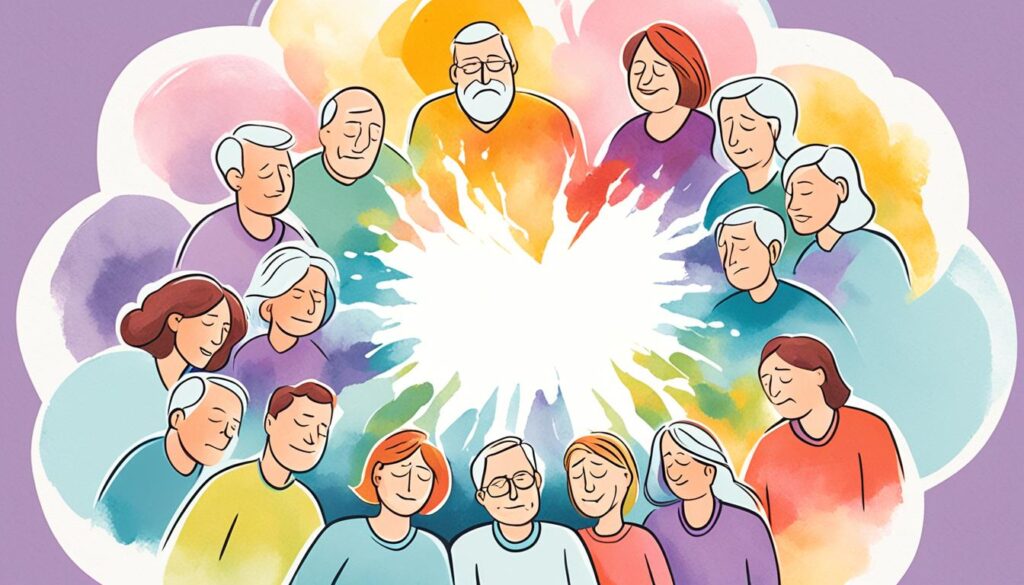
Bereavement groups can change lives, helping people heal and find new meaning. They offer a place for sharing, listening, and support. Group therapy is key for those facing loss's complex emotions.
Creative Group Activities for Personal Growth
Group therapy is a great way to grow personally and find yourself. Creative activities like arts and self-reflection help people understand their thoughts and feelings better. These activities make you more aware of yourself, help you express emotions, and lead to positive changes in a supportive group.
Expressive Arts and Self-Reflection
Expressive arts therapy is a key way to grow in a group. People might make vision boards or share stories through art, music, or writing. These activities let you explore your inner self and find new ways to express and understand yourself.
Self-reflection is also important in group therapy. People think about their values, goals, or past experiences and share them with the group. This helps clear things up, spot patterns, and find new views that can lead to positive changes.
The group's support is key in these activities. Sharing stories and insights helps everyone feel supported and inspired. It encourages exploring different parts of personal growth together.
Group therapy, with its focus on creativity and self-awareness, can really help with personal growth. It's a powerful way to start a journey of self-discovery and positive change.
Mindfulness and Relaxation Group Activities
Adding mindfulness and relaxation to group therapy helps adults with mental health issues. These activities boost present-moment awareness, cut down stress and anxiety, and teach coping skills.
Guided meditation is a top choice for mindfulness groups. The leader takes the group through a calming meditation. This helps everyone focus on their breath, body feelings, and the now. It calms the mind and brings peace.
Deep breathing exercises are another great way to relax. Group members try out different breathing patterns, like the 4-7-8 method or belly breathing. This activates the parasympathetic nervous system and brings on relaxation. It's great for handling anxiety and depression.
Using the senses, like with aromatherapy or touching different textures, adds to the mindfulness and relaxation. The smells of essential oils or the feel of various materials engages the senses. It helps people stay in the now.
By doing these mindfulness and relaxation activities together, group members learn to handle their feelings better. They improve emotional control and boost their wellbeing. They gain a set of strategies to help with their mental health and bounce back stronger.
Group Activities for Building Self-Esteem
Group therapy is a great way for adults to work on their self-esteem. By doing things together and supporting each other, group members can fight negative thoughts. They can also celebrate their strengths and see themselves in a better light. Two key activities for this are affirmations and self-reflection exercises.
Affirmations and Self-Reflection
In the "Affirmations" activity, each group member writes and shares kind words about others. This boosts the person's confidence and helps the group see everyone's strengths. Self-reflection exercises let people think about their values, goals, and what they want to improve on. This helps them feel more valuable to themselves.
Group therapy creates a safe place for adults with low self-esteem to change. Through activities that build confidence and self-esteem, people can fight negative thoughts. They learn how to support themselves and others in their group therapy sessions.

Closing Group Activities and Reflections
As your group therapy journey ends, the final stages are very important. [https://www.carepatron.com/guides/closing-activities-for-group-therapy]Closing activities and reflections let members share their experiences, say thanks, and strengthen their bonds.
A great way to close is with a group ritual, like a circle or a shared affirmation. These activities help members see their progress and get ready for what's next in their mental health journey. Reflections also let people share what they learned and plan for their future.
By doing these closing activities, group therapy members can:
- Strengthen the connections and support networks they've built
- Think about their personal growth and changes
- Find steps to keep up their mental health and well-being
- Feel a sense of closure and thankfulness for the group experience
These closing moments are as crucial as the warm-up and main parts of the session. They make the group therapy sessions valuable and help prepare people for their next mental health steps.
Conclusion
Group therapy is a strong way to help adults with their mental health. It uses creative and interactive activities to build connections and help people grow. This approach also offers ways to deal with mental health issues.
Through activities like narrative therapy and mindfulness, group therapy helps adults take charge of their healing. Studies and clinical findings show its benefits. So, group therapy is becoming more common and easy to find for those who need it.
Using group therapy can change lives, leading to better mental health and more confidence. It's a powerful way to support people on their journey to wellness.
FAQ
What are the benefits of group therapy for mental health?
Group therapy offers many benefits for adults facing mental health issues. It helps with emotional connection, learning, support, encouragement, and guidance. These can lead to better mental, emotional, and physical health.
What is the history of group therapy?
Joseph Pratt started group therapy in 1905. He noticed patients who joined groups did better than those who didn't. Pratt thought the emotional support and connection helped with recovery.
What are some examples of warm-up activities for group therapy sessions?
Warm-up activities include "Two Truths and a Lie" and "Give Me a Minute." In "Two Truths and a Lie," clients share two true and one false fact about themselves. "Give Me a Minute" lets them talk about a random topic for a minute. These activities boost self-expression and group bonding.
How can narrative therapy be used in group therapy?
Narrative therapy uses activities like "My Life Story" and "Statement of Position Map." In "My Life Story," clients pick and share chapter titles of their life. "Statement of Position Map" maps out how a problem affects their life. Expressive art storytelling is also used, where members create art that tells their story.
What are some group activities for addressing anxiety and depression?
Activities for anxiety and depression include "Affirmations," "Healthy Brainstorming," and "Thought Replacement." In "Affirmations," members write positive statements about each other. "Healthy Brainstorming" helps them find ways to improve mental health together. "Thought Replacement" is a CBT technique where they change negative thoughts to positive ones.
What other types of group activities can benefit adults with mental health challenges?
There are many more group activities that help adults, like creative exercises and self-care activities. These can include making vision boards, doing expressive art, or music activities. They also help with stress management and building a supportive network.
How can group therapy help with grief and loss?
Bereavement groups help people dealing with grief and loss. They make it normal to feel grief, offer a safe space for emotions, and create a sense of connection. Activities like "Person to Person" and "Interview Activity" are effective.
What types of group activities promote personal growth and self-discovery?
Creative and self-reflection activities promote personal growth. Expressive arts and guided self-reflection help people understand their thoughts and feelings better. This leads to self-awareness, emotional expression, and positive change.
How can mindfulness and relaxation-based activities be incorporated into group therapy?
Mindfulness and relaxation activities include guided meditation and deep breathing. Sensory experiences like aromatherapy and touching different textures also help. These activities reduce stress, increase awareness, and teach coping skills.
What group activities can help build and maintain healthy self-esteem?
Activities like "Affirmations" and self-reflection exercises help build self-esteem. In "Affirmations," members write and share positive statements. Self-reflection helps them understand their values and goals.
What are some important closing activities and reflections for group therapy sessions?
Closing activities like group rituals and individual reflection help members reflect on their experiences. They express gratitude and strengthen the connections made during the session.
Source Links
- 29 Best Group Therapy Activities for Supporting Adults
- 10 Group Therapy Activities for Adults | Mental Health Center
- Technology that powers experiential businesses
Brain-Boosting Mental Health Games for Adults That Actually Work
Playing therapeutic games can change your mental health journey. They’re great for those in therapy, support groups, or just wanting to feel better. These therapeutic games for adults help build connections, teach coping skills, and improve mental health in a fun way.
Research shows that play helps both kids and adults learn better. Therapy games make sessions fun and effective. They fit into many settings, like CBT, DBT skills groups, and even hospital therapy.
Trying out adult mental health exercises and coping skills games for adults can help you manage emotions and behaviors better. You’ll gain new insights, get stronger, and see how fun therapy can be.
Introduction to Mental Health Games
Mental health games are now a key part of therapy and self-care. They use the power of play to help with many mental health issues. This includes anxiety, depression, trauma, and personal growth. By adding mental health games to therapy, experts can build stronger bonds with patients. They can also help break down barriers and practice new skills.
Benefits of Play in Therapy
Play is a big part of treating symptoms in therapies like trauma-focused CBT. It helps strengthen the bond between therapist and patient. It also helps overcome barriers in group and one-on-one sessions. Plus, it lets people practice what they’ve learned in therapy.
For kids, playing is especially important for healing. Fun activities release dopamine, making them happy, focused, and motivated to finish tasks.
Types of Group Therapy
There are four main types of group therapy that use mental health games: Cognitive Behavioral Therapy (CBT) groups, psychoeducational groups, support groups, and skills development groups. These groups can get better with fun, interactive activities. These activities make people more involved, help them connect, and make the lessons stick.
Ice-Breaking Group Activities
Group activities are a great way to break the ice and help people get to know each other. Two popular games for this are “Two Truths and a Lie” and “Musical Chairs with a Twist.”
Two Truths and a Lie
“Two Truths and a Lie” is a fun game that makes people open up and connect. Everyone writes two true and one false statement about themselves. Then, the group tries to figure out the lie. This game makes sharing personal info safe and builds strong bonds.
Musical Chairs with a Twist
This twist on “Musical Chairs” adds a therapeutic touch. Like the original, there’s one chair less than people playing. When the music stops, the last one standing shares something deep or answers a question. It’s a mix of fun, sharing, and learning in a group.
“Two Truths and a Lie” and “Musical Chairs with a Twist” are great for breaking the ice in groups. They make people feel more at ease and connected. By sharing personal stories, these games build trust and understanding, key for group therapy.
Commonality Bingo
Commonality Bingo is a fun way to start conversations and get to know each other. Everyone gets a bingo card with different things on it. The goal is to talk to others and find people who share the same interests or experiences.
This game makes it easy to start small talks and find common ground. It helps people connect by sharing what they have in common. This can make everyone feel more connected and part of a group.
To play, you need bingo cards with various traits or experiences. People talk to each other, looking for matches on their cards. When they find a match, they mark it. The first to fill a row, column, or diagonal wins.
Commonality Bingo is great for many situations, like team-building or support groups. It promotes open talk and finding shared interests. This helps break down walls and creates a more welcoming space for everyone.
Check out the many [https://drchandrilchugh.com/treatment-for-neuromuscular-disorders/] options to support your mental health. Find the right tools to improve your well-being.
Mental health games and activities for adults
Therapeutic Board Games
Therapeutic board games are now a key tool for mental health experts. They come with prompts or activities that help people talk about feelings, cognitive behavioral therapy (CBT), or dialectical behavioral therapy (DBT). These games are easy to follow and less scary than regular talk therapy.
Experts use these games to teach new ideas, check on skills, or just make therapy fun. They help people connect in a casual, interactive way. This is great for those who find traditional therapy too formal.
Games help people deal with emotions, learn coping skills, and build relationships. They offer a fresh way to tackle mental health issues. For adults, they’re a break from usual therapy but still help with growth and progress.
Family and Couples Therapy Games
When relationships face tough times, starting conversations can be hard, even in therapy. Luckily, there are fun games that can ease the tension and help people connect. The Clouds in the Sky mindfulness exercise and thought-provoking icebreaker questions are great examples.
Clouds in the Sky Mindfulness Exercise
The Clouds in the Sky exercise is perfect for families or couples in therapy. It asks you to imagine a deep blue sky and put distracting thoughts on passing clouds. Letting these thoughts float away helps you see they’re just passing moments. This can lead to a more mindful way of thinking.
Icebreaker Questions
Icebreaker questions are another way to get conversations started in therapy. You might talk about funny stories, embarrassing moments, or your childhood dreams. These questions make it easier for everyone to open up and feel safe.
Using the Clouds in the Sky exercise or fun icebreakers can really help in family and couples therapy. It’s a great way to build connections and encourage deep conversations.
Trust-Building Activities
Fostering trust is key in therapy. A classic activity that helps is the Trust Fall. It’s used in family or couples counseling to build unity and overcome fears of physical contact and being vulnerable.
The Trust Fall
In the Trust Fall, people take turns falling backward with their eyes closed. They trust that others will catch them. This activity makes people let go of control and believe in their support system. It helps build stronger connections, improve communication, and deepen understanding among individuals.
The Trust Fall suits various group sizes and settings. It’s a great way to build trust, promote unity, and overcome anxiety around physical contact and vulnerability. This activity is a powerful step for families or couples wanting to strengthen their bonds.
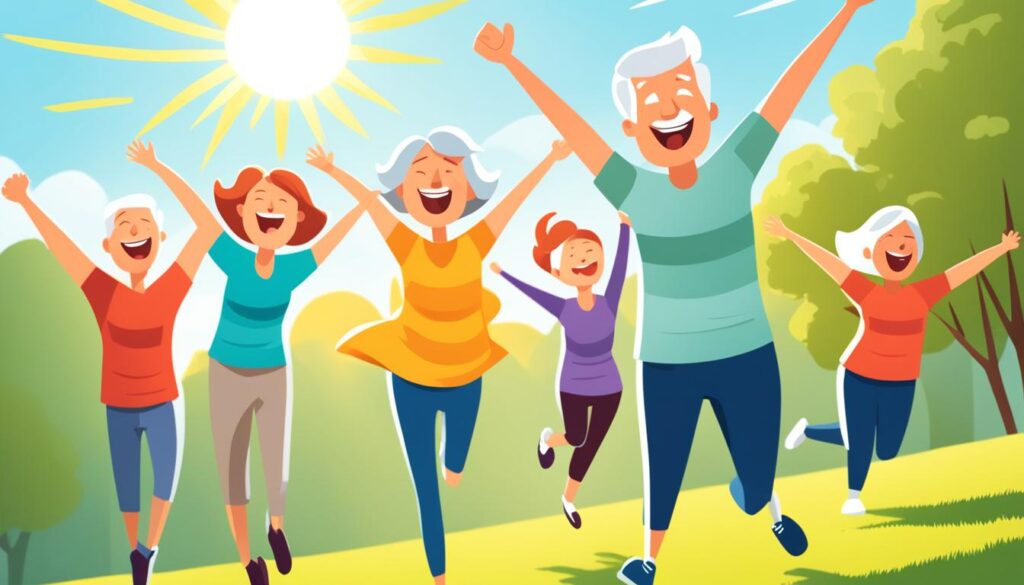
Always make sure the Trust Fall is done with care, considering everyone’s comfort. It’s crucial to create a safe space and give clear instructions for a positive experience for all.
Cognitive Behavioral Therapy (CBT) Games
Using cognitive behavioral therapy (CBT) in play can really help people, kids and adults alike, grasp and use important CBT ideas. Two top CBT games used in therapy are the Coping Skills Quiz Show and CBT Island Quest.
Coping Skills Quiz Show
The Coping Skills Quiz Show is a fun, interactive game that teaches about self-care, mindfulness, and setting goals. It has six categories: Wellness, Mindfulness, Boundaries, Relationships, Asking for Help, and Setting Goals. You can play it in therapy, with a group, or online.
CBT Island Quest
CBT Island Quest is a simple game that teaches CBT ideas, coping skills, and boosts confidence. Players follow card instructions, answering questions on mindfulness and thinking. It helps players deal with negative thoughts and find ways to cope with depression.
Dialectical Behavior Therapy (DBT) Game
Looking for a fun way to learn Dialectical Behavior Therapy (DBT) skills? Check out The Greatest DBT Board Game. It’s a game that turns learning DBT skills into a fun carnival adventure.
This game focuses on four key DBT areas: mindfulness, interpersonal effectiveness, distress tolerance, and emotional regulation. Players face prompts that test their skills in real situations. You might be asked to show how to change an emotion with opposite actions, talk about radical acceptance, or share ways to ask for help well or poorly.
- Mindfulness exercises to enhance present-moment awareness
- Interpersonal effectiveness strategies to improve communication and relationships
- Distress tolerance techniques to manage difficult emotions
- Emotional regulation skills to maintain a balanced emotional state
This interactive board game helps you understand and use DBT principles in a fun setting. It’s perfect whether you’re new to DBT or want to improve your skills. The Greatest DBT Board Game makes learning therapeutic skills enjoyable.
Improving your mental health is ongoing, and fun activities like this DBT game can help. Check out different options to support your well-being and growth.
Self-Reflection and Awareness Games
Exploring one’s inner self is a key step towards personal growth and well-being. The Future Worries activity and the Personal Timeline activity are two fun games. They help people think deeply about themselves and their lives.
Future Worries Activity
The Future Worries activity helps people see what they can and can’t control about future stress. They list things they worry about for different times, then mark what they can control. Next, they come up with three ways to handle each thing they can change.
Personal Timeline
The Personal Timeline activity makes people think about their lives and share a big moment. It could be a tough time to talk about lessons learned or a happy event to share hopes and dreams. This activity helps people understand themselves better, builds group connections, and helps them see how past events shape them.
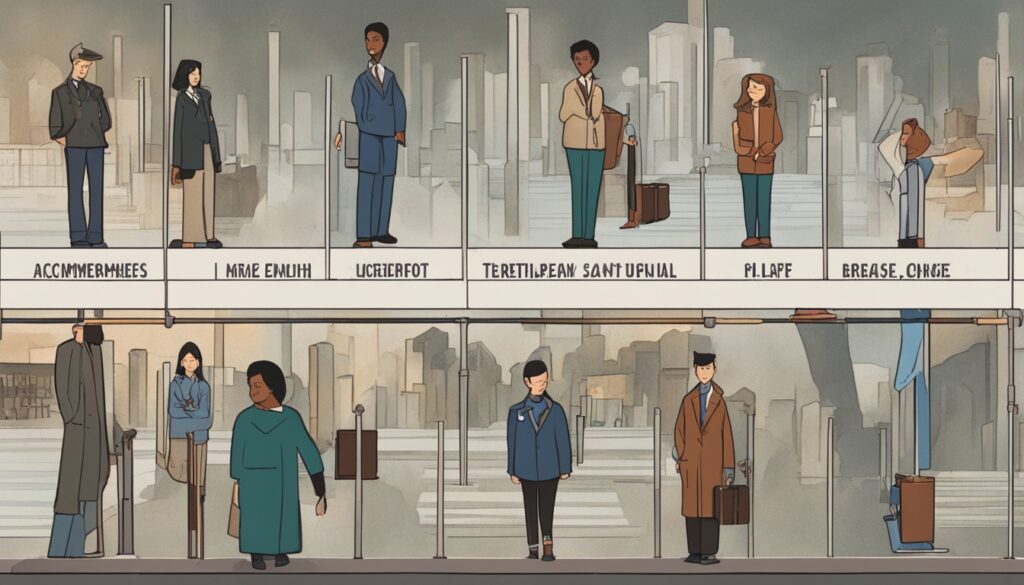
These games help people get to know themselves better, their feelings, and what they can change in their lives. This deeper understanding leads to better ways to deal with stress. It supports their mental health and well-being.
Conclusion
In the wise words of Helen Keller, “Life is either a daring adventure or nothing.” Adding fun, therapeutic games to mental health treatment makes healing exciting and effective for adults. These games help people connect, learn coping skills, and understand their mental health better.
Are you a mental health expert or an adult looking for new ways to care for your mind? These game-based methods offer a fun and interactive way to improve mental health. By using play, you can change mental health treatment and start a journey of growth and self-discovery.
So, let the games begin! Let your inner child out, be creative, and start a bold adventure towards better mental health. The benefits of this journey are huge, and the possibilities are endless.
FAQ
What are the benefits of using therapy games?
Therapy games help build a strong connection and teach important skills like coping. They make learning fun for both kids and adults. These games make therapy sessions less scary, more fun, and more effective.
In what therapy settings can games be used?
Games fit into many therapy settings. This includes CBT, DBT skills groups, and play therapy. They’re also used in hospitals, community groups, and for managing anger or solving problems.
What are some examples of icebreaker games?
Two Truths and a Lie is great for getting to know each other. Musical Chairs with a Twist lets people express themselves and learn in a fun way.
What is Commonality Bingo?
Commonality Bingo is a fun icebreaker that starts deep conversations. It helps people find others who share similar interests. This game lowers social barriers and helps everyone feel more connected.
What types of therapeutic board games are available?
These games often have questions or prompts for discussion. They cover topics like feelings and cognitive behavioral therapy (CBT). They’re a fun way to learn, review skills, or just get to know each other.
What mindfulness and icebreaker exercises can be used in family and couples therapy?
The Clouds in the Sky exercise teaches that thoughts and feelings pass. Fun icebreaker questions lighten the mood and help break down barriers in tough times.
How can the Trust Fall exercise be used in therapy?
The Trust Fall exercise builds trust in family or couples therapy. Players take turns falling back, trusting others to catch them. It fosters unity and helps overcome fears of physical contact and vulnerability.
What are some examples of CBT and DBT games?
The Coping Skills Quiz Show teaches positive self-care and coping skills. CBT Island Quest reviews CBT concepts and builds confidence. The Greatest DBT Board Game makes learning DBT skills fun.
What self-reflection and awareness games are available?
The Future Worries activity helps identify what you can and can’t control. The Personal Timeline encourages self-reflection by drawing a timeline of life and sharing a key moment.
Also Read
Source Links
Engaging Mental Health Activities for Adults: A Guide
Good mental health is key to feeling whole, but it’s hard to keep up with daily life. Luckily, there are many fun mental health activities for adults. These activities help you deal with stress, grow stronger, and know yourself better. They support your emotional, psychological, and social health, making it easier to live healthier.
If you want to feel happier, understand yourself better, or just relax, this guide is for you. It covers a wide range of mental health activities that are both fun and helpful. You’ll find everything from mindfulness exercises to creative hobbies to add to your self-care.
Remember, taking care of your mental health is vital for a happy life. By doing activities that boost your well-being, you can handle stress better, stay positive, and connect more with yourself and others. So, let’s start exploring these engaging mental health activities for adults!
Why Mental Health Activities Matter
Doing mental health activities is key to feeling good overall. They help you work on your mental health. This can prevent some mental health issues or make them less severe.
Proactive Mental Health Management
Mental health activities are great for taking care of your mind. By doing things like meditation, journaling, or exercising, you boost your mental strength. This helps you deal with life’s tough times better and stay positive.
Building Resilience
These activities do more than just help with mental health issues. They help you become more resilient. This means you can handle stress and get back on track after hard times. It makes you better at overcoming life’s challenges.
Enhancing Self-Awareness
Activities like journaling or mindfulness make you more aware of yourself. They help you understand your thoughts and feelings better. This knowledge lets you manage yourself better and find better ways to cope, which is good for your mental health.
By doing different mental health activities, you can take charge of your mental health. You’ll become more resilient and self-aware. These are key to a happy and balanced life.
Mindfulness and Meditation Exercises
Practicing mindfulness exercises and meditation can greatly improve your mental health. It helps you focus on the now by using your breath or body sensations. This can reduce stress and anxiety, making you feel calmer.
These practices make you more aware of your thoughts, feelings, and body. This awareness helps you handle challenges better. Regularly doing these exercises can change how you feel overall.
- Breath awareness meditation: Pay attention to your breathing, noticing each inhale and exhale without thinking too much about it.
- Body scan meditation: Slowly focus on each part of your body, noticing any feelings or tightness.
- Mantra meditation: Repeat a calming word or phrase in your mind to keep your thoughts steady and relaxed.
- Guided imagery: Imagine a peaceful place to help you feel calm and happy.
Adding these mindfulness and meditation practices to your daily life can be very helpful. They can help you deal with stress, control your emotions, and find more peace inside. Try different methods to see what works best for you.
Journaling for Emotional Well-being
Writing down your thoughts and feelings can greatly improve your mental health. It’s great for practicing gratitude, tracking your mood, or understanding yourself better. Journaling brings many benefits that can make you feel emotionally better.
Gratitude Journaling
Gratitude journaling means writing about what you’re thankful for. It helps change your focus to the positive side of life. By doing this, you learn to value the small pleasures and see the good around you.
This practice has been linked to a happier mood, more optimism, and a better life overall.
Mood Tracking
With mood tracking, you record your emotions and feelings during the day. This gives you insights into your mental health. You can see patterns in your mood and understand what affects your feelings.
This is very helpful for those facing mental health issues. It lets you see how you’re doing over time and find out what triggers your emotions.
Adding journaling to your daily routine can change your life. You might focus on gratitude, mood tracking, or both. Writing helps with self-reflection, managing emotions, and understanding yourself better. Start journaling and see how it helps with your mental health, gratitude, and mood tracking.
Physical Activities for Mental Health
Keeping fit can greatly improve your mental health. Regular physical activity for mental health helps lower anxiety, stress, and depression. Activities like a brisk walk, yoga, running, or lifting weights can help. Exercise and mental well-being are closely linked.
Exercise does wonders for both body and mind. By doing physical exercise benefits, you boost your fitness and brain health. It can make you feel happier, more energetic, and better overall. Eating foods full of omega-3 and vitamin D also helps your mental health.
- Try daily activities like walking, jogging, or cycling to improve your mental health.
- Look into different exercises, like strength training or high-intensity workouts, to find what you like and suits you best.
- Join a sports team or start a new hobby to add social fun and community to your exercise routine.
It’s important to pick activities you like and can do every day. By focusing on physical activity for mental health, you can see how your body and mind work better together.

Creative Pursuits and Hobbies
Doing things you love can greatly improve your mental health. Creative hobbies act as natural mood lifters. They offer a break from stress and help you relax. Whether it’s making art or dancing, these activities boost your well-being.
Art and Crafts
Art can be a great way to reflect, relax, and manage emotions. Activities like painting or crafting let you be creative and mindful. Making something with your hands is therapeutic. It helps you focus and escape anxious thoughts.
Music and Dance
Music and dance are great for your mental health. Listening to music or playing an instrument can calm you down. Dancing lets you express yourself, lift your mood, and improve your health. Whether it’s a fun dance class or a calming yoga session, these activities change your mental health for the better.
Adding creative hobbies to your life supports your mental health. Through art, music, and dance, you open up new ways to express yourself, relax, and manage emotions. This can make you feel better mentally and more resilient.
Social Connections and Support Groups
Having strong social connections and being part of supportive communities greatly helps your mental health. By taking part in social activities, you can feel better and lessen depression symptoms.
Connecting with family, joining groups with similar interests, or helping out in local projects can make you feel like you belong. These activities create a support system that’s key for staying emotionally balanced and resilient.
Being in mental health support groups, either online or in person, is also very helpful. These groups are safe places where you can share your story, get support, and learn from others who understand what you’re going through.
Putting social connections and community support first is good for your mental health. Whether you’re into community mental health events or support groups, being socially active can change your life for the better.
Mental Health Activities for Adults
Mental health is key to feeling good overall. Adding different activities to your day can really help your mood and mind. This guide shares many ways adults can look after their mental health, get stronger, and know themselves better.
There are many options, from mindfulness and meditation to writing, moving your body, and making art. Trying these out can help you handle stress and anxiety better. It also helps keep your emotions in balance.
Adding these activities to your daily life can change how you feel. They can help reduce stress, improve your mood and health, or just make you feel better overall. These activities are great for anyone wanting to focus on their mental health.
- Mindfulness and meditation exercises
- Journaling, including gratitude journaling and mood tracking
- Physical activities, such as exercise, yoga, and outdoor pursuits
- Creative pursuits, like art, music, and dance
- Engaging in social connections and support groups
- Practicing relaxation techniques, such as deep breathing and progressive muscle relaxation
- Exploring cognitive-behavioral therapy activities, like thought records and cognitive restructuring
- Spending time in nature and engaging in outdoor activities
By adding these self-care and wellness activities to your day, you’re taking steps to look after your mental health. This can make your life better overall.
Relaxation Techniques
Keeping good mental health is key for our overall well-being. Adding relaxation techniques to your daily life can help. These methods can cut down stress, slow your heart rate, and bring calm and focus.
Deep Breathing Exercises
Deep breathing is a simple yet strong way to relax. By focusing on your breath, you can start your body’s relaxation response. This can help you manage anxiety, lower stress, and boost your mental health.
Progressive Muscle Relaxation
Progressive muscle relaxation is another great technique. It means tensing and then relaxing each muscle group in your body. This helps you notice and release physical tension. By doing this, you can relax more deeply and feel less stressed or anxious.
Using relaxation techniques like deep breathing and progressive muscle relaxation can help with stress. Find what works for you and stick with it to improve your mental health.

If you’re facing anxiety or mental health issues, get help from a professional. They can offer personalized support and help you find natural ways to deal with anxiety.
Cognitive Behavioral Therapy Activities
Cognitive Behavioral Therapy (CBT) activities are great for improving mental health. They include thought records and cognitive restructuring as key techniques.
Thought Records
Thought records mean writing down your thoughts, feelings, and actions. This helps you see your thought patterns and spot negative beliefs. It lets you challenge these thoughts for a more balanced view.
Cognitive Restructuring
Cognitive restructuring is about changing negative thoughts to positive, true ones. This technique helps you think more positively and less distorted. It makes your feelings better and changes how you see things.
Using CBT activities like thought records and cognitive restructuring can help you. They work well with therapy and let you take charge of your mental health. These methods are proven to help with anxiety, depression, stress, and trauma.
By trying out thought records and cognitive restructuring, you learn to spot and change negative thoughts. This boosts your well-being and makes you more resilient.
Nature and Outdoor Activities
Spending time in nature can greatly improve your mental health. It could be a walk in the park or a hike in the mountains. Being in nature can deeply affect your well-being.
Studies show that nature activities help reduce stress, anxiety, and depression. Just breathing in fresh air and enjoying the outdoors can calm your mind. It helps you feel more connected and grounded.
There are many outdoor activities that can improve your mental health. You can garden, watch birds, camp, or kayak. These activities make you appreciate nature more and help you feel peaceful and balanced.
- Hiking through scenic trails to reconnect with nature
- Gardening or tending to a backyard oasis to nurture both plants and your mental health
- Engaging in outdoor sports and activities like cycling, swimming, or rock climbing to boost physical and mental resilience
- Simply taking a mindful stroll in your local park or green space to reap the benefits of spending time in nature
Adding nature activities to your self-care can greatly help your mental health. By enjoying the benefits of spending time in nature, you can find peace, clarity, and connection. This can improve your life in many ways.
Professional Support and Resources
The mental health activities in this guide are very helpful. But, they can’t replace professional care. If you’re facing ongoing, serious mental health issues, it’s key to get help from experts.
Experts like therapists, counselors, or psychologists offer specific support and proven treatments. They’re trained to help you find coping strategies, deal with feelings, and improve your well-being.
There are also many mental health resources that can add to your professional care. These include hotlines, online groups, educational stuff, and local groups focused on mental health.
By getting professional help and using these resources, you can take a full approach to your mental health. Remember, you’re not alone in this fight. There are experts and resources here to help you every step of the way.
Conclusion
Engaging in various mental health activities is a great way for adults to handle their emotions better. It helps build resilience and improves life quality. Activities like mindfulness and meditation, creative pursuits, and nature can be part of your daily life.
Putting self-care first and using available resources and support can greatly improve your mental health. It’s important to try different activities and find what works for you. Making mental health a top priority is key.
These mental health activities can help reduce stress, lift your mood, and increase self-awareness. They are powerful tools for better well-being. Start your self-care journey and live your best life.
FAQ
What are mental health activities and how do they support well-being?
Mental health activities help with your emotional, psychological, and social health. They help you handle stress, connect with others, and make healthy choices. These activities can lessen the impact of mental health issues by offering structure and promoting better habits.
They also boost your mood, increase resilience, and help you understand your mental state better.
How can mental health activities contribute to building resilience?
Mental health activities are about learning to deal with stress and recover from tough times. They teach you to be more aware of yourself. This helps you face challenges with clarity and calm.
Doing these activities regularly can greatly improve your mental health.
What are the benefits of mindfulness and meditation exercises?
Mindful meditation helps you stay in the moment by focusing on your breath or body. It reduces stress and anxiety, making you feel calmer. These practices improve your awareness of thoughts, feelings, and body sensations.
This helps you handle challenges better with clarity and calmness.
How can journaling support emotional well-being?
Writing down your thoughts and feelings helps you understand your emotions better. Gratitude journaling shifts your focus to positive thoughts. Mood tracking shows patterns and what affects your mood.
Journaling offers a chance for self-reflection and has been shown to improve mood in people with mental health issues.
How do physical activities impact mental health?
Regular exercise can make you feel less anxious and depressed. It supports your overall health, including your brain health. This can improve your mood and energy levels.
Good nutrition also helps your mental health by managing mood disorders with certain nutrients.
How can creative pursuits and hobbies enhance mental well-being?
Enjoying activities you love can act as a natural mood booster. Hobbies offer a break from daily stress, bring joy, and help you relax. Creative activities like art and crafts boost self-expression and relaxation.
Music and dance are great for managing emotions, reducing stress, and improving your mood.
How do social connections and support groups benefit mental health?
Being around others makes you feel better and lowers depression. Connecting with your community, friends, or joining groups with shared interests can boost your mental health. These connections give you a sense of belonging and support.
They are key for emotional balance and resilience.
What are some relaxation techniques that can help manage stress and anxiety?
Activities like deep breathing, yoga, or progressive muscle relaxation can reduce stress and anxiety. They lower your heart rate and make you feel calm and focused. These exercises are great for managing stress and improving mental well-being.
How can Cognitive Behavioral Therapy (CBT) activities support mental health?
CBT activities, like thought records and cognitive restructuring, are helpful for mental health improvement. They let you change beliefs and challenge negative thoughts. This empowers you to take charge of your mental health.
How do nature-based activities benefit mental well-being?
Being in nature can calm your mind. Outdoor activities like hiking or gardening offer a sense of grounding and connection. Nature-based activities reduce negative thoughts, increase positive feelings, and help restore your mental health.
When should I seek professional support for mental health challenges?
While the activities mentioned here are great, they shouldn’t replace professional care. If you’re facing serious mental health issues, get help from mental health experts. They offer specific support and evidence-based treatments for your mental health needs.
Source Links
How to Heal After a Breakup: Tips for Moving On
Breakups can be tough, even if the relationship was ending. Losing your partner means losing shared dreams and hopes too. Many feel sad, disappointed, and like they’ve failed after a breakup.
It’s hard to adjust to life after a breakup. But, there are steps to heal, process your feelings, and move forward with confidence.
Healing after a breakup takes time, whether it was recent or happened long ago. Understanding the emotional and physical effects helps. Letting yourself feel your emotions and taking time to heal is key.
Adding new activities to your life, reaching out to friends, and managing social media exposure can help. These steps support your healing journey.
Healing from a breakup isn’t straightforward. It’s important to practice acceptance and let go of the relationship. Reflect on what you learned from it. With patience, self-care, and focusing on your well-being, you can get through this tough time. You’ll emerge stronger and more resilient.
Understanding the Impact of a Breakup
Breakups can deeply affect our well-being, hitting us both in our minds and bodies. It’s key to see and deal with these effects to heal well.
The Psychological Impact
Feeling like you’ve lost a part of yourself is common after a breakup. You might swing between guilt, doubt, and a hit to your self-esteem. Not facing these feelings can make healing take longer.
The Physical Impact
Breakups can hurt our health too. You might start sleeping poorly, have a weaker immune system, feel numb or overly sensitive, and feel tired and heavy. The stress can leave you feeling drained.
Seeing the psychological impact of breakup, physical impact of breakup, and emotional impact of breakup helps us understand our challenges. This knowledge prepares us for the healing journey ahead.
Allowing Yourself to Feel the Emotions
Dealing with breakup emotions can be tough and overwhelming. But, it’s key to let yourself feel and express all the emotions that come with ending a relationship. Ignoring these feelings can make healing take longer.
It’s important to acknowledge and work through feelings like sadness, anger, or guilt. This might mean journaling, talking to loved ones, or getting help from a therapist.
Feeling the emotions of a breakup is a big part of getting better. By going through these feelings, you start to move on and find closure. There’s no one right way to handle these emotions. Just be kind and patient with yourself as you go.
By accepting all your feelings, you start to heal and find your way. Getting support and using healthy ways to cope can help you deal with your emotions after a breakup. Remember, healing isn’t always straight forward. But with time and care for yourself, you’ll come out stronger and more resilient.
Taking Time and Space for Healing
Healing from a breakup is not easy. It’s a non-linear healing process with ups and downs. Everyone heals at their own pace.
It’s crucial to give yourself time and space to heal. This might mean cutting back on social life, focusing on self-care, or feeling your emotions. Remember, everyone’s healing time is different. Be patient and trust the healing process.
The Non-Linear Process of Healing
It’s normal to feel like you’re moving forward, then hit a roadblock. This is part of healing. The journey has ups and downs, and that’s okay. With time and care, you’ll keep healing and moving forward.
- Embrace the non-linear nature of the healing process
- Expect good days and bad days as you work through the emotions
- Avoid putting a strict timeline on your recovery
- Be patient and compassionate with yourself throughout the journey
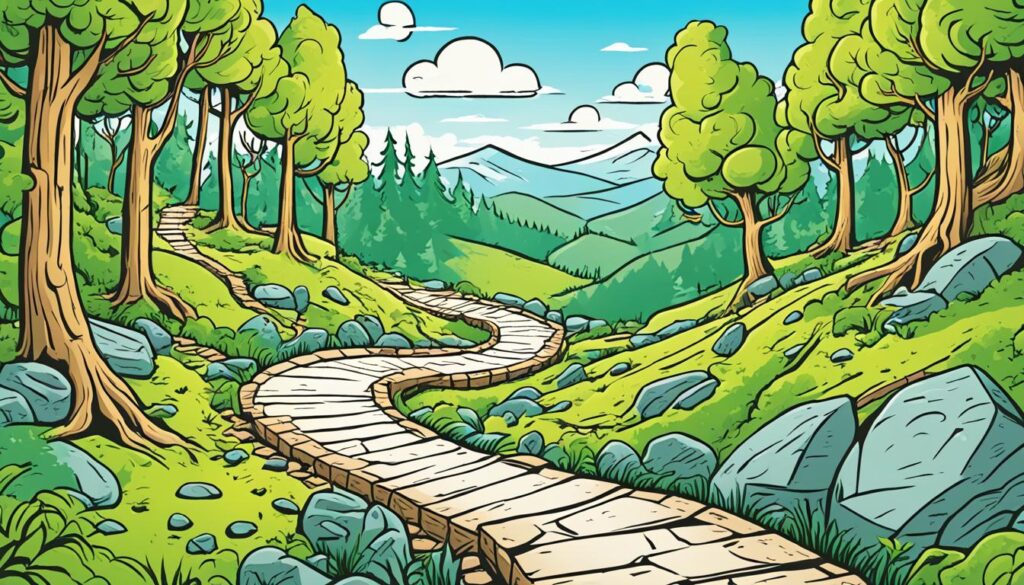
Trust the healing process and give yourself the time you need. This way, you’ll handle the ups and downs of recovery better. You’ll come out stronger on the other side.
Readjusting and Adapting to the Changes
Adjusting to life after a breakup is tough. Your ex was a big part of your daily life. Now, things you once loved, like your evening coffee, might feel strange. Be kind to yourself as you get used to your new life and find new things to enjoy. It’s key to handle these changes with care and kindness towards yourself.
After a breakup, you might need to change your daily habits a lot. This can feel weird, but it’s a chance to focus on what’s really important to you. Use this time to try new hobbies, find new passions, or just enjoy being on your own.
- Acknowledge the discomfort of adjusting to a new normal, and give yourself time and space to adapt.
- Experiment with different activities and routines to find what brings you joy and fulfillment in this new phase of your life.
- Resist the urge to immediately fill the void left by your ex-partner, and instead focus on rediscovering who you are outside of the relationship.
Changing after a breakup takes time, but with patience and kindness towards yourself, you can get through it. See this as a chance to make your life your own again. Create a future that excites and fulfills you.
Incorporating New Activities into Your Routine
After a breakup, trying new hobbies can help you heal and grow. It’s a chance to explore things you’ve always wanted to do, like dance classes or learning a new skill. This can help you find your interests and strengths outside of the relationship.
Getting into new hobbies after a breakup boosts your confidence and independence. It also gives you a break from the tough feelings. As you spend time on self-improvement, you’ll start to feel more purposeful and happy.
- Try a new fitness class, such as yoga, Pilates, or dance, to nurture your body and mind.
- Explore a creative hobby, like painting, writing, or photography, to express your emotions and discover a new passion.
- Learn a new language or take up a musical instrument to challenge your brain and acquire a valuable skill.
- Volunteer in your community or get involved with a cause you care about to connect with others and find a sense of purpose.
Embracing self-improvement through new activities can change your life. By focusing on your growth and exploration, you’ll heal and find new passions. These can make your life richer even after the breakup.
Seeking Support from Your Social Circle
After a breakup, it’s key to lean on friends and family for support. They can offer a listening ear and a shoulder to cry on. If you’re pulling away from others, try to reconnect, even for a short coffee or call. Keeping these connections strong can really help you cope.
The Importance of a Support System
Your social circle is crucial for emotional support after a breakup. Talking to trusted friends and family can help you make sense of your feelings. They can give you a new view, comfort you, and suggest self-care to help you heal.
Being with loved ones can also take your mind off the heartache. It lets you enjoy positive moments and focus on good relationships. This is great when you’re tempted to think too much about the past or your ex.
- Confide in close friends and family members about your feelings
- Engage in activities with your support system to take your mind off the breakup
- Allow your loved ones to provide a listening ear and shoulder to lean on
- Reconnect with your social circle, even if it’s just for a brief catch-up
The importance of friends and family after a breakup is huge. Social support after a breakup is a key part of healing. It helps you get through tough times and move towards a happier life.
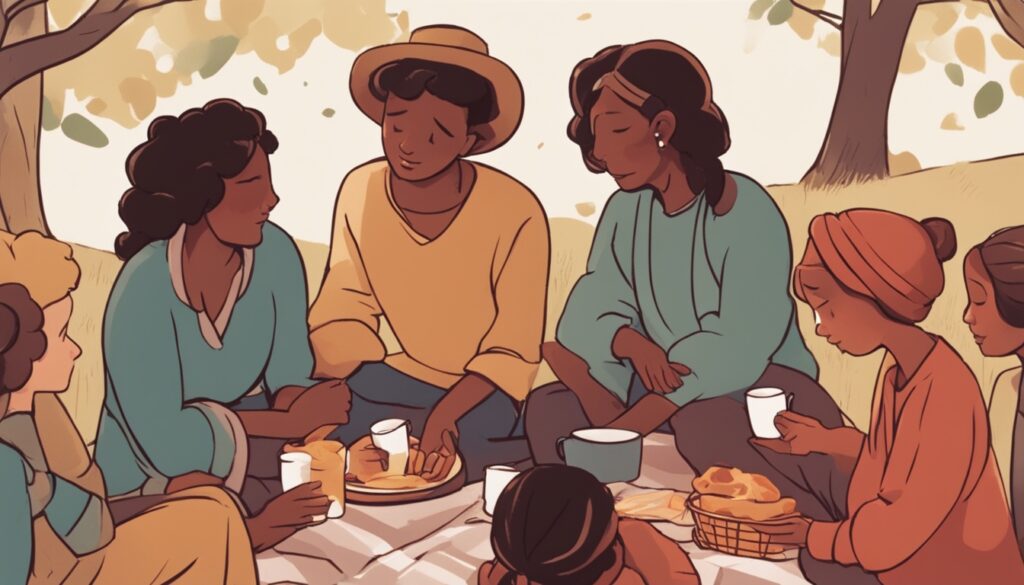
Mindfully Managing Social Media Exposure
After a breakup, it’s easy to keep checking your ex’s social media or posting “revenge” content. But, this isn’t a good way to cope. Seeing your ex’s life updates can make you feel bad again. It’s important to be careful with your social media use to help you heal.
Consider taking a break from social media or limiting your view of your ex’s online life. This can stop you from looking for their updates and help you focus on healing. Make your social media feed positive by following accounts that inspire and support you.
- Avoid constantly checking your ex’s social media accounts, as this can prolong the pain and make it harder to move on.
- Consider taking a break from social media altogether or limiting your time on these platforms to give yourself space to heal.
- Carefully curate your social media feed to include content and accounts that uplift and inspire you, rather than triggering painful memories or emotions.
By being mindful of your social media use, you can protect your mental and emotional health. This lets you focus on healing and moving forward. Remember, healing after a breakup is not straightforward, but with careful steps, you can make it easier on yourself.
Dealing with a breakup is tough, but getting help from a professional can make a big difference. A neurologist like Dr. Chandril Chugh can offer valuable advice and support. With the right help and self-care, you can come out of this experience stronger and more resilient.
How to heal after a breakup
Healing after a breakup is tough but important. It’s a journey that varies for everyone. You can take steps to help yourself through this tough time. From feeling your emotions to trying new things, recovery is unique for each person.
One key step in healing is to accept and deal with your feelings. Feeling sad, angry, or grief is normal after a breakup. Letting yourself feel these emotions helps you start to heal.
When healing, it’s vital to take time for yourself. This might mean cutting ties with your ex, getting rid of reminders, and focusing on self-care. Engage in new hobbies, enjoy nature, or seek help when needed. The main thing is to look after your well-being during this hard time.
Healing after a breakup doesn’t follow the same path for everyone. It can be up and down, but with support and gradual changes, you can come out stronger.
Practicing Acceptance and Letting Go
Healing after a breakup means accepting and letting go of the relationship. Think about what led to the end. You can do this alone or with help from loved ones or a counselor.
Accepting the end is hard but key to moving forward. Acknowledge the situation and let go of the past. This makes room for new beginnings and helps you focus on the future. Letting go means remembering the relationship but knowing it’s time to move on.
Reflecting on the Relationship’s End
Take time to think about why the relationship ended. You might journal, talk to a friend, or see a counselor. Understanding the end helps you move on fully.
- Identify the key reasons for the relationship’s end
- Consider your own role and growth opportunities
- Acknowledge any unresolved feelings or lingering questions
- Seek closure through open and honest communication, if possible
Letting go and accepting the end is a deep change. Be kind to yourself as you move through this. It opens up new possibilities and a brighter future.
Conclusion
Remember, moving past a breakup is not a straight path. You’ll face ups and downs, progress and setbacks. But, with resilience and the right strategies, you can come out stronger and more aware of yourself. Take time to process your feelings, lean on a supportive network, and be patient with healing.
The future may seem unclear now, but trust that each step brings you closer to moving on and building a fulfilling life. By seeing this as a chance for personal growth, you can turn a tough time into a stepping stone for a brighter future. Focus on self-care, emotional healing, and the strength of your support system.
You’re not alone in this new chapter. There are resources and experts ready to help you. With resilience, kindness towards yourself, and a readiness to adapt, you can get through the tough times of a breakup and come out stronger than ever.
FAQ
How can I heal emotionally after a breakup?
Let yourself feel all the emotions that come with a breakup, like sadness, anger, or guilt. It’s okay to express these feelings in healthy ways. You can do this by journaling, talking to friends and family, or getting professional help.
How long does it take to heal from a breakup?
Healing from a breakup is not a straight line. Be kind to yourself and don’t rush the process. Give yourself the time and space you need. Trust that you will heal at your own pace.
How can I adjust to life after a breakup?
Adjusting to a new normal can be tough. You’ll need to get used to changes in your daily life and routine. Be patient with yourself as you settle back into your life and find new ways to fill the space left by your ex.
What are some healthy coping mechanisms after a breakup?
Trying new things and hobbies can help boost your confidence and independence. It can also help you find your own interests and strengths. This can be a great way to move forward and grow personally.
How can I maintain a healthy social media presence after a breakup?
Be careful with how you use social media after a breakup. You might want to take a break or limit your exposure to your ex’s online life. Instead, fill your feed with things that inspire and support your healing.
How can I find closure after a breakup?
Think about what led to the end of the relationship to find closure. You can do this by yourself or with the help of friends, family, or a counselor. Acknowledging the situation and letting go of the past can help you move forward and focus on the future.
Source Links
Coping with Divorce: Strategies for Emotional Healing
Going through a divorce is tough and can make everyday tasks hard. It changes your life in big ways, making it hard to stay productive. You'll feel many strong emotions like sadness, anger, and confusion.
It's important to accept these feelings as part of healing. This article will give you tips to help you deal with divorce and start healing emotionally.
Getting through a divorce can feel overwhelming, but you can get stronger on the other side. By understanding how you might feel and using helpful strategies, you can move forward. You'll start to take back your life and find new purpose.
Recognize and Accept Your Emotions
Divorce can make you feel like you're on an emotional rollercoaster. You might feel sad, angry, tired, frustrated, and confused. It's key to know that these feelings are normal during the healing process after a divorce. Accepting your emotions is a big step in moving forward.
Going through the emotional changes of divorce is tough. But, it's vital for your well-being. Letting yourself feel and express your emotions in a healthy way is important. This could mean talking to a close friend or writing in a journal. It helps you deal with the grief and start healing.
Navigating the Emotional Landscape of Divorce
Divorce can feel overwhelming. But, remember, the emotions you're feeling are valid and normal. By understanding and accepting your feelings, you start to heal. This healing process might not be straight forward, but with time and taking care of yourself, you'll come out stronger and more resilient.
- Acknowledge the range of emotions you're experiencing, from sadness to anger to confusion.
- Allow yourself to feel and express these emotions in healthy ways, such as talking to a therapist or writing in a journal.
- Avoid trying to suppress or ignore your feelings, as this can prolong the healing process and make it more difficult to move forward.
- Be patient and compassionate with yourself as you navigate the emotional divorce recovery.
Don't Isolate Yourself
Coping with divorce is tough, but don't cut yourself off from others. It's key to connect with your social support network and find people who understand what you're going through. This can offer great emotional support and prevent loneliness.
Talking to friends, family, or support groups can really help you deal with divorce's emotional ups and downs. By staying connected, you keep your focus sharp, stay productive, and look after your well-being.
If you're finding it hard to cope alone, don't hesitate to get professional help. Therapists and counselors offer specific advice and support to ease the divorce recovery process.
You don't have to face this alone. Reaching out and building a strong support network is a key part of healing and growing personally.
Practice Self-Care
Going through a tough divorce means taking care of your emotional and physical health. Doing self-care helps you handle stress, get stronger, and find happiness during hard times. Make sure to look after your mind, body, and soul.
Nurture Your Body and Mind
First, think about your physical health. Add regular exercise to your day, like walking, yoga, or a sport you love. Eat foods that are good for you, full of nutrients. Use relaxation methods like meditation, deep breathing, or mindfulness to calm your mind and ease your feelings.
Do things that make you happy and feel good. Revisit hobbies you used to love or try new ones that catch your interest. Enjoy nature, read books that inspire you, or hang out with friends and family who support you.
Avoid Unhealthy Coping Mechanisms
It might seem easy to turn to alcohol, drugs, or too much of something else to cope. But these habits can cause more harm and slow down your healing. Focus on finding healthy ways to deal with your feelings that are good for you.
Self-care is essential, not just a luxury, when you're going through a divorce. Taking care of yourself helps you get through this change and come out stronger.

Maintain Stability and Routines
Divorce can shake up almost every part of your life, making you feel stressed and unsure. Keeping things as normal as possible can bring comfort. Try to stick to your usual daily and weekly plans, like when you go to bed, eat, and work. Waiting to make big changes after separating or divorcing can also make the transition easier.
Having a steady daily routine is key to feeling stable during divorce recovery. This means:
- Waking up and going to bed at the same time every day
- Having regular meals and snacks
- Setting time for exercise, relaxation, and taking care of yourself
- Having specific hours for work or other duties
Keeping your daily routines helps you feel in control and predictable during divorce. This is important for getting through the tough times of divorce.
Even though your life has changed a lot, sticking to daily routines gives you structure and control. This helps you deal with divorce and keep your emotional health strong.
Seek Professional Help
If you're finding it hard to deal with the emotional effects of your divorce, getting professional help is key. A counselor or therapist can offer you the tools and support to work through your feelings. They can help you develop coping strategies and guide you through the next phase of your life.
Don't be shy to ask for professional counseling and mental health support when you need it. A skilled mental health expert can tackle any deep-seated issues, like depression or anxiety, that the divorce has made worse. They'll help you with the divorce recovery process and give you coping strategies tailored to your needs.
Remember, asking for help is a sign of strength, not weakness. It takes bravery to seek support, but it can greatly improve your emotional healing and personal growth.
When looking for a therapist, counselor, or other mental health professional, aim to find someone you feel at ease with. They should offer the specific care and advice you need during this challenging time. Don't hesitate to look around until you find the right match.
Coping with Divorce
Divorce is a tough experience that can make you feel overwhelmed. It means losing a relationship and the dreams you shared. This can lead to feelings of grief, anger, confusion, and uncertainty about the future.
It's key to let yourself feel these emotions during this hard time. Ignoring them can make healing take longer. But, it's also vital to find healthy ways to cope. Your well-being is most important.
Strategies for Coping with Divorce
- Seek social support: Be around family and friends who can offer emotional and practical help. Talking to those you trust can make you feel comforted and understood.
- Practice self-care: Take care of your body and mind by doing things that make you happy and relaxed. This could be exercise, mindfulness, or hobbies you love.
- Maintain stability and routines: Try to keep your daily life as normal as possible. Stick to your usual routines and schedules. This can help you feel grounded during big changes.
- Seek professional help: Think about seeing a therapist or counselor who knows about divorce recovery. They can offer valuable advice and support as you deal with the emotional effects of divorce.
Coping with divorce takes time, strength, and a readiness to heal. By facing your feelings and using healthy coping methods, you can come out of this tough time stronger and with a new purpose.
Embrace Change and New Opportunities
The end of a marriage can feel tough, but it also opens doors for personal growth and new experiences. You're now free to try new hobbies, chase your goals, and find your independence. See this change as a way to learn more about yourself and what you like.
Looking forward to the good things ahead helps you start rebuilding your life. This time is perfect for trying new things, pushing your limits, and finding new passions. You might learn a new skill, visit a new place, or go after a dream you've had for a while. The end of a marriage can lead to many new chances.
Change might seem scary, but it can also change your life in great ways. Embrace the journey of finding yourself and let go of the past. You have the power to make the future yours, full of growth, new chances, and a better understanding of who you are.
Embrace the Journey of Self-Discovery
Use this time to dive into your interests, chase your dreams, and grow your independence. Do things that make you happy, push you, and help you know yourself better. This time can be a big step towards growing personally and finding yourself.
Address Feelings of Loneliness
Going through a divorce can feel very isolating. You might miss your partner and feel like you've lost your social circle. It's important to deal with these feelings of loneliness. They can really affect your mental health and well-being.
One good way to fight loneliness is to talk to your friends and family. They can offer support and someone to listen. Also, joining a divorce support group can connect you with others who understand what you're going through.
Try new hobbies and activities that you like. Doing things you enjoy can give you a sense of purpose and help you meet new people. This could be anything from joining a fitness class to volunteering in your community.
Remember, overcoming loneliness after a divorce takes time and effort. But it's a key part of getting better emotionally. By facing these feelings and building a new social circle, you can get through this tough time with hope and strength.
Here are more ways to deal with loneliness during your divorce recovery:
- Take care of yourself by doing things that make you happy and relaxed, like meditation, journaling, or being in nature.
- See a therapist or counselor to help you work through your feelings and find better ways to cope.
- Try new things, like a new hobby, traveling, or changing your career. Doing something different can boost your confidence and give you a sense of purpose.
By facing your loneliness and building a supportive network, you can get through the tough times of divorce. You'll come out stronger and more resilient.
Let Go of the Past
Coping with divorce is tough, and one big step is to let go of the past. It's normal to miss what was and to think about what could have been. But, holding on too long stops you from healing and moving forward. To move on, focus on acceptance, forgiveness, and living in the now.
Stop doing things that keep you stuck in the past, like always checking your ex's social media. Instead, focus on taking care of yourself and building a new, fulfilling life. Welcome the changes and new chances that come with this new chapter. Don't be scared to try new hobbies, interests, or experiences you've always wanted to do.
- Practice acceptance and forgiveness to let go of the past
- Focus on the present moment and self-care
- Avoid behaviors that keep you stuck in the past
- Embrace change and new opportunities for personal growth
Remember, the end of a marriage can be devastating. But it's also a chance for you to move on after divorce, recover emotionally, and heal. By letting go of the past and looking to the future, you can start a fulfilling new chapter in your life.

Conclusion
Going through the emotional ups and downs after a coping with divorce can feel tough. Yet, it's possible to come out stronger and more hopeful. By facing your feelings, getting support, taking care of yourself, and seeing the chances for growth, you start healing and moving forward.
Don't let the end of a marriage define you. It's just the start of a new chapter. With the right approach and mindset, you can find happiness again. The journey to get over a divorce is hard, but seeing the growth and change as opportunities can make you stronger and more ready to live the life you want.
You're not alone in this journey. With the help of loved ones, experts, and focusing on your well-being, you can get through this and find happiness again.
FAQ
What are the common emotions experienced during and after a divorce?
After a divorce, you might feel sad, angry, tired, frustrated, and confused. These feelings can be tough, but they're part of healing. It's key to accept them.
How can I avoid isolating myself during the divorce process?
Talk to friends, family, and support groups to get through tough times. Connecting with others who've gone through divorce can offer support and reassurance. Staying connected helps keep your mind sharp, work on track, and your health good.
What are some self-care strategies I can use to cope with the stress of divorce?
Do things that make you happy, like exercise, meditation, and hobbies. Stay away from harmful coping like drinking too much or using drugs. Keep a healthy routine, rest well, and be kind to yourself as you go through this hard time.
How can I maintain a sense of stability and routine during the divorce process?
Keep your daily and weekly routines as normal as you can. This includes things like bedtime, meal times, and work hours. Avoid big changes in the first few months after your separation or divorce. This helps you feel more stable and normal.
When should I consider seeking professional help to cope with the emotional aftermath of my divorce?
If you're finding it hard to deal with your feelings after the divorce, getting professional help is a good idea. A counselor or therapist can give you tools and support to handle your emotions. They can help you develop healthy ways to cope and move forward.
How can I embrace the opportunities for growth and change after a divorce?
Ending a marriage is tough, but it can also be a chance to grow and find new things you like. See this change as a way to discover who you are and what makes you happy. Focus on the good things ahead to start rebuilding your life in a fulfilling way.
How can I address feelings of loneliness during and after a divorce?
Connect with friends and family, join groups, or try new hobbies to build a new circle of friends. Being active in finding ways to fight loneliness can help you heal and move forward.
How can I let go of the past and focus on the present during the divorce process?
Work on accepting, forgiving, and living in the now. Don't get caught up in checking your ex's social media or thinking about past fights. Instead, focus on taking care of yourself and building a new, happy life.
Source Links
- How to Heal and Start Rebuilding Your Life After Divorce
- Coping With Separation And Divorce
- Coping with a Breakup or Divorce - HelpGuide.org
How to Cope with Divorce: Practical Advice and Support
Going through a divorce can feel overwhelming and emotionally tough. But, with the right strategies and support, you can come out stronger. This guide offers tips and insights to help you get through the divorce process. It also covers how to deal with the emotional impact and start rebuilding your life.
Divorce is a personal and complex journey. There's no single way to handle it. By understanding the emotional impact, building a strong support network, and taking care of yourself, you can make things easier. This article aims to give you the tools and resources to move forward with resilience and grace.
You're not alone in this journey. Many people have gone through divorce and found new purpose and self-discovery. With the right mindset and focus on your well-being, you can overcome challenges and build a brighter future. Let's look at strategies and support to help you cope with divorce and rebuild your life.
Understanding the Emotional Impact of Divorce
Divorce is a tough and emotional experience. It's more than just legal paperwork. It means saying goodbye to your marriage and dealing with feelings like anger, sadness, and uncertainty. It's important to let yourself feel these emotions to start healing.
Grieving the Loss of Your Marriage
Ending a marriage means losing a part of your life and dreams. You might feel sad, nostalgic, or even like you've failed. It's okay to feel these things. You can work through them by journaling, talking to friends, or getting professional support.
Coping with Feelings of Anger, Sadness, and Uncertainty
Divorce brings out many feelings, like anger, sadness, and uncertainty. These can be a lot to handle. But finding ways to deal with them is key. Try stress-relieving activities like exercise or meditation. And don't be afraid to reach out to friends or a therapist for help.
Going through a divorce is a long journey. It needs patience, kindness towards yourself, and facing hard feelings. By dealing with the emotional impact of divorce, you can start to heal. This will help you move forward to a brighter future.
Building a Support System During Your Divorce
Going through a divorce can feel like a wild ride of emotions. Having a strong support system can really help. Talk to your close friends and family for a listening ear, help, and someone to lean on. They can offer comfort and understanding as you grieve.
Think about joining a divorce support group too. These groups are safe places for people going through similar things to meet, share stories, and feel less alone. Being part of a group can give you a sense of community and empathy. You'll also get insights from others who know what you're going through.
Seeking Comfort from Friends and Family
Your loved ones are key to your support during this tough time. Don't be shy to ask for help. They might offer a listening ear, help with tasks, or just a break from the stress.
Considering Joining a Divorce Support Group
- Connect with others who understand what you're going through
- Receive emotional support and empathy from peers
- Gain valuable insights and coping strategies from group discussions
- Feel less alone in the divorce process
Having a strong support system, with both personal connections and a divorce support group, can be a big help. Surround yourself with people who offer emotional and practical support. This can make going through the divorce process easier and help you come out stronger.
Prioritizing Self-Care Throughout the Process
Going through a divorce can be tough and emotionally draining. That's why it's key to focus on self-care. Taking care of your body and mind helps you deal with divorce better.
Begin by adding stress-relieving activities to your daily life. Self-care during divorce might mean working out, meditating, or doing hobbies you love. These things can help you handle divorce stress and give you a break from the emotional ups and downs.
It's okay to ask for help with everyday tasks from friends, family, or professionals. Sharing the load can give you more time to focus on your own divorce self-care strategies and your well-being.
Remember, taking care of yourself isn't selfish. It's a vital part of healing. By putting self-care first, you can tackle the challenges of divorce and come out stronger.

Exploring Therapy or Counseling Options
Going through a divorce can be tough. Getting help from a therapist or counselor can make a big difference. They can teach you how to handle your feelings and help you see things in a new way.
Benefits of Divorce Counseling
Divorce counseling has many benefits. With a therapist who knows about divorce, you can find healthy ways to deal with your emotions. You'll learn how to express your feelings and make a plan for the future.
Counseling also helps you understand divorce's legal and financial sides. It teaches you how to co-parent well.
Finding the Right Therapist or Counselor
It's key to find a therapist or counselor who fits your needs and personality. Look for someone who specializes in divorce and has helped others going through similar situations. Make sure their way of talking and their schedule work for you.
Divorce counseling is a strong tool for dealing with the emotional and practical parts of ending a marriage. By finding the right therapist or counselor, you can move through this change with more clarity and purpose.
Discovering New Interests and Hobbies
Going through a divorce can be tough, but finding new things to do can help. Trying out new hobbies can make time go by faster and make you feel fulfilled. It's a great way to learn more about yourself during this change.
It could be picking up an old hobby or trying something completely new. Doing things that make you happy and excited can help you deal with the tough feelings of divorce. You could start a new sport, learn to play a musical instrument, or try out creative arts. There are so many ways to find new hobbies.
Keeping Yourself Occupied and Engaged
Keeping busy during a divorce stops you from thinking too much about the hard times. Here are some ideas to keep you busy and interested:
- Join a local club or group that matches your interests, like a hiking club, book club, or cooking class.
- Look into online learning platforms and sign up for courses or workshops that catch your eye, such as coding, gardening, or a new language.
- Volunteer with a charity that means something to you, giving back to your community and meeting people who share your values.
- Give a new creative activity a try, like painting, writing, or photography, and enjoy the process of expressing yourself.
By trying out new hobbies after divorce and staying engaged during divorce, you start a journey of self-discovery. This journey can be powerful and healing.
Avoiding Conflict with Your Former Spouse
Getting through a divorce can be tough, but it's key to avoid fighting with your ex. Keeping things civil can make things easier for both of you. It helps you both move on with your lives.
One key way to handle conflict is through effective communication. When talking about divorce stuff, stay calm, respectful, and focused on solutions. Don't let emotions get the best of you or start fights.
- Set clear boundaries and expectations to minimize the potential for disagreements.
- Refuse to participate in drama or attempts to provoke a reaction from you.
- Communicate in writing whenever possible to create a clear record of your interactions.
Using these divorce communication strategies can help you minimize divorce drama. It makes things calmer for you and your family. The aim is to manage conflict with your ex-spouse in a way that lets you both move forward with respect.
At the end of the day, keeping things professional with your ex is key. It takes some work, but it's worth it. It makes the divorce less stressful and lets you both look ahead.
Cultivating a Positive Mindset
Going through a divorce can be tough, but having a positive mindset can really help. Thinking positively can give you the strength to get past tough times and see the chances for growth that come your way.
The Power of Positive Thinking
One key tool you have is changing negative thoughts into positive ones. When you feel down or unsure, try to see things from a different angle. Look for the good in every situation and be thankful, even when things are hard. This positive thinking keeps hope alive and helps you stay strong during the divorce process.
Reflecting on Personal Growth Opportunities
Divorce can change you in big ways, leading to self-discovery and personal growth. Take time to think about what you're learning and how you're getting stronger. This divorce mindset can make you come out of this period as a more resilient person, ready for what's next.
Remember, a positive mindset isn't about ignoring your problems. It's about using your outlook to beat them. By choosing positive thinking and seeing the personal growth possibilities, you can go through divorce with more strength and hope.
Navigating Legal Matters and Mediation
Going through a divorce can feel overwhelming, but there are ways to make it easier. Consider using divorce mediation to solve problems together instead of fighting in court. A neutral mediator helps you and your ex find solutions that work for both of you, saving time and money.
It's key to know about the legal steps and paperwork in a divorce. Organizing your financial documents can make things clearer. If you're lost or need help, a divorce lawyer can offer advice and support.
Choosing mediation or traditional divorce is a big decision. Being organized and informed helps you make the best choice for you. With the right strategy and support, you can get through the legal part of a divorce and start fresh.
Rebuilding Your Life After Divorce
Coming out of a life after divorce can feel tough, but it's also a chance to grow and find yourself. Give yourself time to mourn the end of your marriage. But, also, start looking forward to what's new. With the right strategies and support, you can get through the tough times and come out stronger, ready for what's next.
Self-care is key to moving on after divorce. Make sure to do things that make you feel good, like yoga, meditation, or being in nature. Having a circle of friends and family who listen and support you is also crucial.
Try new things and find what makes you happy during this time. Finding new hobbies can help you find your way again and make life more meaningful.
Remember, getting over a divorce isn't easy. It has ups and downs, good days and bad. Be gentle with yourself and get help if you need it. With patience, resilience, and a positive outlook, you can start a new chapter full of life.

Conclusion
Going through a divorce is tough, but you can get through it with the right coping strategies and support resources. Be kind to yourself, ask for help when you need it, and take care of yourself. This will help you move forward with hope and purpose.
By taking steps to deal with the emotional and practical parts of divorce, you'll learn more about yourself. You can look forward to a brighter future. Joining a support group, trying new hobbies, or seeing a therapist can help. The main thing is to look after your well-being and build a strong base for your life after divorce.
The path ahead might seem tough, but with the right attitude and support, you can get through it. You're not alone, and there are many resources and experts ready to help you. Keep in mind, you can come out of this stronger than ever.
FAQ
What are some practical tips for coping with divorce?
Divorce is tough, but you can get through it. Build a strong support network, take care of yourself, and get professional help when needed. Try to avoid fighting with your ex.
How can I manage the emotional impact of divorce?
It's key to feel and work through your emotions like sadness, anger, and doubt. Reach out to friends, family, or a therapist for support. They can help you through the tough times.
What can I do to rebuild my life after a divorce?
Rebuilding your life after a divorce can feel overwhelming. Give yourself time to mourn the loss of your marriage. But, start looking forward to new adventures too.
Focus on taking care of yourself, try new things, and stay positive. This will help you move forward.
How can I avoid conflict with my former spouse during the divorce process?
Keep your conversations calm and constructive. Set clear boundaries and don't let drama or arguments happen. Staying civil with your ex makes the divorce easier and helps you both move on.
What are the benefits of seeking professional help during a divorce?
Getting help from a therapist or counselor can really help during a divorce. They offer tools to handle your feelings, strategies to cope, and a fresh view on your situation.
How can I simplify the legal aspects of my divorce?
Think about using mediation to work things out together. This can make the process less stressful. Learn about the legal steps and paperwork needed. If you're unsure, don't hesitate to get advice from a divorce lawyer.
Source Links
- Coping with a Breakup or Divorce - HelpGuide.org
- How to Help your Friend or Loved One Get Through a Divorce — When It's Knot Forever
- How to Deal With Divorce [Coping Guide] — Talkspace
Feeling Jittery? Causes, Neurological Reasons & Remedies
Have you ever felt jittery, weak, or shaky? It's a feeling that can be unsettling and hard to manage. But don't worry, there are ways to deal with it and find peace again.
We'll look at why you might feel jittery, from low blood sugar and dehydration to more serious health issues. We'll also talk about how to handle anxiety-induced shaking and when to get help. By understanding the causes and finding the right solutions, you can beat the feeling of jitteriness and improve your well-being.
What Causes Feeling Jittery?
Have you ever felt that uneasy, anxious feeling of jitteriness? You're not alone. It can come from low blood sugar, dehydration, or too much caffeine. Knowing what causes it can help you find relief.
Low Blood Sugar (Hypoglycemia)
Low blood sugar, or hypoglycemia, is a common reason for feeling jittery. When your blood sugar drops below 70 mg/dL, you might feel weak, shaky, or tired. This can happen if you skip meals or have a condition that affects your blood sugar.
Dehydration
Feeling jittery can also be due to dehydration. Not having enough fluids can cause tremors, dizziness, and anxiety. Drinking plenty of water each day can help avoid these problems.
Excessive Caffeine Intake
Too much caffeine can also make you feel jittery. Caffeine speeds up your heart rate and makes you feel anxious. If caffeine makes you jittery, try drinking less or choosing decaf.
Figuring out why you feel jittery can help you fix it. Listen to your body, drink water, and watch your caffeine intake to stay well.
Medical Conditions Associated with Jitteriness
Feeling jittery, weak, or shaky can be a sign of a health issue. Many conditions can cause these feelings, like irregular heart rhythms or neurological disorders. Knowing the possible causes helps in finding relief.
Irregular Heart Rhythm (Arrhythmia)
An arrhythmia, or irregular heart rhythm, can make your heart pump blood poorly. This can lead to feelings of jitteriness, dizziness, and fatigue. Some arrhythmias, like atrial fibrillation, often cause these symptoms.
Tremors
Uncontrollable muscle trembling, or tremors, can make you feel jittery. Tremors are linked to conditions like Parkinson's disease. They can also come from stress, anxiety, or some medicines.
Chronic Fatigue Syndrome
Chronic fatigue syndrome makes you feel constantly tired and weak. It can make you feel jittery and shaky. This condition is complex and involves physical, emotional, and cognitive factors.
Parkinson's Disease
Parkinson's disease can make you feel jittery and trembly. It affects motor functions and can cause shaking in the hands and limbs as it gets worse.
If you keep feeling jittery or have other worrying symptoms, see a healthcare professional. They can find out what's causing it and help you with treatment.
Anxiety and Panic Disorders
Anxiety and panic disorders make you feel jittery. They cause muscle tension, shaking, and trouble focusing. This makes you feel restless and uneasy.
Generalized Anxiety Disorder (GAD)
Generalized Anxiety Disorder (GAD) means feeling worried all the time for months or years. People with GAD often have muscle tension, get easily irritated, and have trouble sleeping. They also feel mentally strained from constant anxiety. This stress can make you feel jittery and shake.
Panic Attacks and Panic Disorder
Panic attacks, linked to Panic Disorder, cause shaking and trembling. During a panic attack, your body's stress response is overactive. It releases a lot of adrenaline, leading to a fast heartbeat, shortness of breath, and shaking. This can be very scary and make you feel jittery.

Knowing how anxiety and panic disorders relate to feeling jittery is key. By understanding the causes and getting help, you can manage these feelings. This way, you can feel more in control and stop feeling jittery.
Identifying Anxiety-Induced Shaking
Anxiety can show up in many ways, like shaking or trembling. When you feel anxious, your body gets ready to either fight or run away. This means you might start shaking as your body gets ready for action.
It's important to know when you're shaking because of anxiety. This shaking usually happens without warning and might make you feel your heart race, sweat, or feel dizzy. But, shaking from other health issues like low blood sugar or Parkinson's disease starts slowly and has different symptoms.
- Noticing sudden shaking or trembling can help you handle these moments better.
- It's key to know the difference between shaking from anxiety and other health issues to get the right treatment.
- Talking to a neurologist can help figure out why you're shaking and create a plan to help you.
Understanding what anxiety-induced shaking looks like and getting help when you need it can help you manage your anxiety. This keeps your nervous system healthy.
Remedies for Feeling Jittery
If you're feeling jittery, there are ways to help. Keeping hydrated and eating well is key to feeling better. Drinking enough water and eating nutritious foods can really help.
Hydration and Nutrition
Drinking lots of water keeps your body's fluids balanced. This helps avoid dehydration, which can make you feel weak and jittery. Eating a diet full of fruits, veggies, whole grains, and lean meats gives you the nutrients you need. This supports your health and energy.
Physical Activity and Exercise
Being active can help with jitteriness. Activities like walking, yoga, or light exercise can lessen stress and anxiety. These are often reasons why you might feel jittery. Adding exercise to your day can make you feel more stable and calm.
Focus on staying hydrated, eating well, and being active to fight jitteriness. If you keep feeling jittery, see a doctor. They can check for any health issues that need treatment.
Relaxation Techniques for Anxiety
Feeling jittery can be tough. Two great ways to relax are progressive muscle relaxation and yoga/mindfulness exercises.
Progressive Muscle Relaxation
Progressive muscle relaxation means you tense and then relax different muscle groups. It helps you feel both physically and mentally calm. This method is easy to do anywhere, making it great for controlling jitteriness all day.
Yoga and Mindfulness Exercises
Yoga and mindfulness, like deep breathing and meditation, are also great for easing anxiety. They help you focus on now, quiet your mind, and let go of tension. Doing yoga and mindfulness regularly can help you handle anxiety and feel calmer inside.
Try different relaxation methods to see what suits you best. Being consistent is important, so add these practices to your daily life. Taking steps to manage anxiety and relax can help you control your mind and body. This reduces the impact of jitteriness.

Medical Treatments for Anxiety
If you're dealing with ongoing or severe anxiety, you might need professional help. There are many ways to manage your symptoms and feel better overall.
Therapy Options
Cognitive-behavioral therapy (CBT) is a top choice for anxiety. It helps you find out why you're anxious and teaches you how to handle your thoughts and feelings. With a trained therapist, you can change negative thoughts and learn better ways to cope.
Medication Management
Sometimes, taking medication can help with anxiety. Drugs like benzodiazepines or SSRIs can ease anxiety symptoms and make you feel calmer. Your doctor will work with you to find the right medicine and amount for your needs.
Looking into medical treatments for anxiety, like therapy or medication, is a big step towards better mental health. With a healthcare expert, you can create a plan that tackles your anxiety and boosts your life quality.
For more info on the perks of regular neurological care, see this: 10 Reasons to See a Neurologist.
Lifestyle Modifications for Jitteriness
Dealing with jitteriness is not just about medicine. Making changes in your life can really help. By using stress-reduction methods and better sleep habits, you can fight the effects of anxiety.
Begin by adding relaxation activities to your daily life. Yoga, meditation, or deep breathing can calm your mind and body. This can lessen the jittery feelings. Also, cutting down on caffeine and staying active can make you feel more balanced and calm.
Managing Stress
- Practice relaxation techniques like yoga, meditation, or deep breathing exercises.
- Engage in regular physical activity to manage stress and anxiety.
- Identify and address sources of stress in your life, such as work or personal relationships.
Improving Sleep Hygiene
- Establish a consistent sleep schedule, going to bed and waking up at the same time each day.
- Create a sleep-friendly environment by keeping your bedroom cool, dark, and quiet.
- Limit screen time and exposure to blue light before bedtime to promote better sleep.
By making these changes, you can help manage your jitteriness and improve your health. Remember, even small changes can make a big difference. So, try different things to see what works for you.
When to Seek Professional Help
If you feel jittery and can't manage it on your own, it's time to get help. Talk to a doctor or a mental health expert. They can figure out why you're feeling this way and help you get better.
It's key to get help if the jitteriness stops you from doing daily tasks or if you feel really anxious. If you're feeling severe anxiety or always feel jittery, you should seek advice. A doctor can check for any health issues and help you find ways to cope.
Remember, looking for help shows you care about your health. With the right support, you can understand what's happening and find ways to feel better. This can improve your life a lot.
FAQ
What causes feeling jittery?
Feeling jittery can come from low blood sugar, not drinking enough water, or too much caffeine.
What medical conditions are associated with jitteriness?
Conditions like an irregular heartbeat, tremors, chronic fatigue, and Parkinson's disease can make you feel weak, shaky, and tired.
How are anxiety and panic disorders linked to jitteriness?
Anxiety and panic disorders, like Generalized Anxiety Disorder (GAD) and Panic Disorder, make you jittery and shake. This is because of the body's stress response.
How can I identify anxiety-induced shaking?
If you suddenly feel jittery and trembly, it might be anxiety making you feel that way.
What remedies can help alleviate feelings of jitteriness?
Drinking enough water, eating well, staying active, and relaxing can help you feel less jittery.
What medical treatments are available for anxiety-related jitteriness?
Therapy like cognitive-behavioral therapy (CBT) and medicines for anxiety can help manage your anxiety and reduce the jitteriness.
What lifestyle changes can help manage jitteriness?
Reducing stress, sleeping well, cutting down on caffeine, and staying active can help you handle jitteriness better.
When should I seek professional help for my jitteriness?
If you can't manage your jitteriness with self-care and lifestyle changes, or if it gets worse, you should see a professional. This is especially true if it affects your daily life or comes with other worrying symptoms.
Source Links
- Shaky, weak, and tired: Causes and treatments
- Anxiety Shaking: Causes and Treatments
- Anxiety: Symptoms and Signs





